Last Updated on January 31, 2019
Since 2008, the Kanopy streaming service has served as the “Netflix of the education sector,” providing DVDs and online videos to over 3,000 universities and colleges around the world. Now even if you aren’t a student you can access their vast online movie library – which is home to hundreds of period dramas – for free.
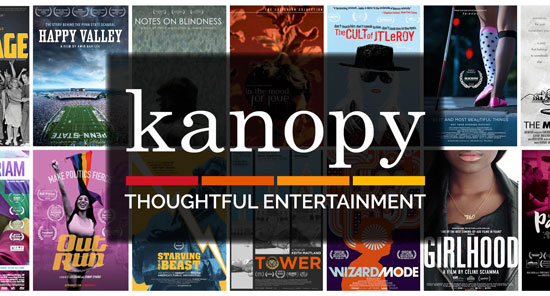
Olivia Humphrey was working in media rights management, for BBC Worldwide and others, and had an idea for a new movie platform with a catalog of films that would fill in gaps in the curricula at higher education institutions. Kanopy made sense: students could expand their horizons and learn through film, and the teachers would have a new way to communicate in the classroom.
Now CEO Humphrey, who has long been passionate about independent film, has parlayed Kanopy’s success in universities to something to benefit the wider community: public libraries all over the US can offer Kanopy to their members, for free.
It’s the best streaming service you’ve never heard about, filled with “quality, literate” content. Each month, hundreds of new titles are added to the over 30,000 feature films already available to stream – including those from Paramount, Universal Studios, Music Box Films, and the Criterion Collection. With a focus on “thoughtful entertainment,” you’ll find a collection of arthouse, independent and classical films you can watch on demand on smartphones, tablets, PCs and smart TVs.
There’s even a Willow and Thatch Top Picks playlist on Kanopy!
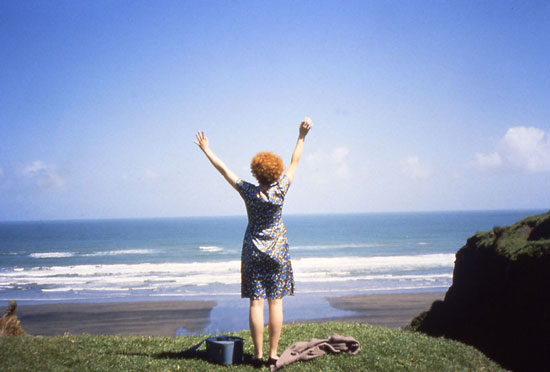
Kanopy offers some hard-to-find period films and “one of the most unique and compelling collections of film on the planet.” Their films range from documentaries, indie and foreign films, must-see classics and blockbuster movies, and their “sophisticated discovery engine encourages our users to challenge themselves to watch films outside of their comfort area.” With hundreds of content providers, you can discover new on-demand programming from PBS, KINO Lorber, Film Movement and Music Box Films, among others.
It’s a great model – public libraries only pay for films that are actually watched, and the content owners get paid 50% of the sales, while users get to watch for free. Everyone – from the film distributors, to Kanopy, to the librarians – can track which films are getting the most plays, and that informs the decisions about which films to bring to the platform.
That means fans of period dramas should have careful read through the list below of period dramas already included on Kanopy, so you don’t miss out on anything… and to make sure that everyone gets the message of how much we appreciate having quality historical, costume, and period drama movies available to us for free.
 Below, Willow and Thatch talks with Kanopy CEO Olivia Humphrey about the streaming service, and what it means for lovers of period dramas with a library card.
Below, Willow and Thatch talks with Kanopy CEO Olivia Humphrey about the streaming service, and what it means for lovers of period dramas with a library card.
Then, keep reading for a list of some of the historical, costume and period dramas that are free to stream on Kanopy.
At the bottom of the article are some suggested documentaries like Last Days of Anne Boleyn (BBC) and In Search of the Brontes (BBC), so be sure to read all the way through.
Some things to note before you keep reading:
- Library card holders aged 13 and over can create an account, but by no means are all the offerings appropriate for children.
- The majority of these period dramas are not rated, so unless there is a notation under the film you can assume that no rating has been given.
- Look for Willow and Thatch recommended and favorite film notes below, as well as links to trailers where available. Feel free to leave comments here as to which movies you enjoyed.
- There are a lot of foreign films here… if you are unaccustomed to subtitles, you could try the waters with the period romances The Well-Digger’s Daughter and Bride Flight.
- Most films have captions, indicated by a “CC” button on the film. The captions can be launched for a video by clicking the captions button that appears on the video player console (at the bottom of the film) once it has started playing. A small subset of films may not yet have the captions published on them yet in which case you can simply place a “captions request” like this.
- Play credits are used to play films on Kanopy and the number of play credits available per month varies by library. Users are provided with a set number of play credits in their account each month and this is refreshed on the first day of each calendar month. For example, anyone with a NYPL card can stream up to ten films each month, and anyone with a Brooklyn Public Library card can stream six videos a month. If you belong to both libraries, you’d get sixteen credits, combined.
- To “spend” one of your play credits, the user must press play on a film and have the film fully load and start playing. Once a play credit is logged, the user then has a full 3 days (72 hours) to watch the film as many times as they like without using another play credit.
- You can watch Kanopy on desktop browsers (Safari, Firefox, Chrome on Mac OS x and Internet Explorer, Firefox, Chrome on Windows), smartphones, tablets, PCs and smart TVs. Once your profile is set up you can use Kanopy on device apps such as Roku, Apple TV, IOS, Android, via HDMI Cable, and Chromecast, etc. Learn more.
- You can create watchlists of your favorite films, so bookmark this Willow and Thatch page so you can know what to add to it. When you create a profile, Kanopy can tailor the website to be more geared to the films you are interested in based on what you have watched previously.
- If you are delighted to know about all the period dramas on Kanopy, please share this article with your friends so more people can benefit from the new streaming service.
- Visit here to see if your local public or college library has Kanopy. If your library isn’t currently participating, you’ll be able to request that they join.
Willow and Thatch in Conversation with Olivia Humphrey

Willow and Thatch: Kanopy offers such a diverse array of quality programming, exactly the type of movies and television series that Willow and Thatch readers are drawn to, like literary adaptations, historical and period costume dramas, and British and Australian series, as well as historical documentaries and biopics. You also offer so many award-winning and International period films which are difficult to find in the US. Can you tell our readers a little about how Kanopy selects the programming?
Olivia Humphrey: We carefully curate our collection so it aligns with our motto of “thoughtful entertainment”. We aim to offer a diverse range of films and series from arthouse films, foreign TV series to indie docs. Many of these films are not readily available to our audience so it’s a great destination for those seeking films that will make you think and aren’t necessarily mainstream. Willow and Thatch viewers will no doubt migrate to our Historical Drama collection which offers a diverse range of period dramas like Georgian, Victorian, and 20th Century.
(Willow and Thatch has curated a period drama playlist for Kanopy that you can see here which is part of the Historical Drama Collection, but keep reading for a fuller list of period dramas on Kanopy.)
We select films that we think our audience will enjoy. We aim to really encourage our users to be adventurous, to extend their range and try watching films outside of their comfort zone and they are often surprised by discovering a whole new genre of film to enjoy.
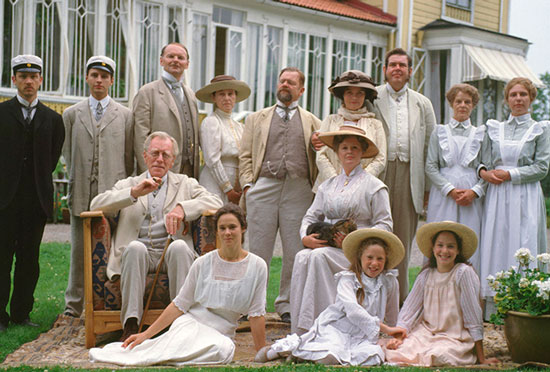
WAT: Making the Kanopy database available to members of public libraries not only gives them access to thoughtfully curated content, but addresses one of our readers’ main concerns, which is how their viewing habits fit into their budgets. Can you talk a little about how you decided to make Kanopy open to public libraries, and how many public libraries are currently participating? Are all of them located in the US?
OH: The public libraries have budgets that they use to purchase resources for their members. Traditionally this was physical resources like books, DVDs, magazines but as consumer behavior has migrated online, libraries are responding by making these resources available digitally. Kanopy is an obvious choice for libraries as we focus on thoughtful entertainment – films that make users think, educate or at a minimum, make our viewers feel enriched so they leave Kanopy feeling like it was time well spent.
Kanopy has been streaming to higher ed students and professors for over 5 years, and it was always difficult when students graduated and called in to Kanopy, asking how they could access. We had to say “you can’t”. So migrating our millennial audience to watch via their local public library is a natural growth opportunity for us.
We are very careful about balancing the needs of the library, and the return on investment they expect to receive with the needs of our filmmakers who are trying to generate a sustainable income for their films. The public library market offers a very democratic way to access a special collection like Kanopy while supporting a thriving film industry.
We are working (or trialing) with nearly all the major public library networks in the US. We work with many Canadian and Australian library networks too.
WAT: The number of films available to stream per user in a month varies a bit, based on one’s public library branch. Is that because larger libraries participate differently in Kanopy? Are you considering a pay-per-view option for individuals who have used up their monthly viewing credits?

OH: Each Public Library sets their play credits cap. Some public libraries have approached cautiously as they understand the demand and response from their members and are gradually increasing the cap as they see their members enjoy the platform. We are exploring a variety of ways users can increase their caps so we’ll have more news on this in the coming months.
WAT: Do all Kanopy public library users have access to the same content? For example, could someone accessing the database via their Brooklyn Public Library membership stream the same exact movies as a NYPL member?
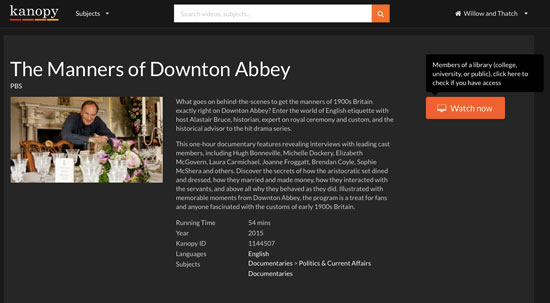
OH: Theoretically yes, unless a library has specifically requested to remove certain genres of film. The difference will be the interface. eg Brooklyn Public Library members will see local films about Brooklyn or by Brooklyn filmmakers and vice versa for other libraries. We try and ensure our platform is relevant to local interests.
WAT: Most streaming services license titles for a period of time, so movies periodically get removed, and new ones are added. Does Kanopy follow the same model?

OH: We very rarely remove any titles as our filmmakers and suppliers tend to be happy with Kanopy and elect to just auto-renew so our collection continues to grow in volume which is one of the advantages of our model. We believe if we look after our filmmakers, they will stay with us forever!
WAT: Kanopy has a wide selection of factual series and programs from PBS that are likely of interest to lovers of the historical period drama genre. The platform is rich with programming like Lincoln@Gettysburg, Liberty! The American Revolution, Shakespeare Uncovered, Secrets of the Dead, The First Silent Night, The Orphan Trains, American Experience – Walt Disney, The Story of the Jews, Ken Burns: The Dust Bowl, A Midwife’s Tale, The Roosevelts, The Polar Explorer and The Manners of Downton Abbey, among others, but doesn’t appear to carry series shown on PBS Masterpiece. Are there any plans to include any of the new, or older, Masterpiece Theatre titles?
OH: Yes, many PBS Masterpiece series are coming soon for the public library market.
WAT: That’s exciting news – Willow and Thatch readers will be sure to be updated! Can you talk about your selection of titles in the BBC drama collection* that are widely available through universities that subscribe to Kanopy? They include mini-series of classic literary adaptations like Bleak House and Jane Eyre, and you even offer The Go-Between which isn’t available elsewhere in the US.
Do you have plans to make the BBC drama collection available to public library users? I’d imagine the appeal would be widespread both because of their quality and because readers are generally interested in watching films of books adapted to the screen, especially when they are produced by the BBC.
OH: We do hope to expand our BBC mini-series collection to public libraries. Streaming to public libraries is a new market for BBC so they are working through this with us. We hope to grow and extend our BBC collection to public libraries in the near future.
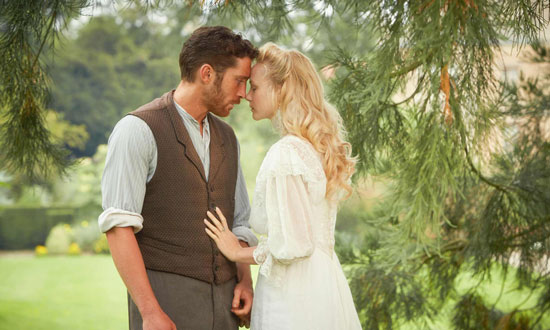
WAT: Your website says that additional titles can be requested. Are you taking suggestions only from institutions and libraries, or are you also considering individual requests?
OH: Yes, we love requests which can be sent to support@kanopy.com. We can’t promise success but it’s great to hear feedback and wishlists from our audience.
WAT: In addition to budgetary concerns and frustrations with lack of access to high quality International content, many Willow and Thatch readers have let me know how important closed captioning is to them, so in addition to expressing my personal gratitude for Kanopy, I’d like to thank you on their behalf for creating this amazing resource. What is on the horizon for Kanopy?
OH: Thank you. We are launching on a variety of new devices to ensure Kanopy is available everywhere. More and more libraries are going live in the US and beyond and our content team have some exciting new releases to announce soon!
WAT: In the US. Kanopy is currently working with more than 200 public library systems. What can readers do if their local public library isn’t yet participating in Kanopy?
OH: We encourage your readers to let their local public library know of their interest in Kanopy. We know libraries love hearing from their members and if they know there is a demand for Kanopy, they are more likely to consider us! Alternatively if your members are studying at a college or university, they can access Kanopy through their school library.
Visit here to see if your local public or college library has Kanopy.
To help keep this site running: Willow and Thatch may receive a commission when you click on any of the links on our site and make a purchase after doing so.
Some of the Period Dramas Streaming on Kanopy

The Actress – Die Schauspielerin (1988): Maria, a rising theater star in Nazi Germany, is in love with Mark, a Jewish actor. She accepts her dream job at a theater in Munich, while Mark is banned from performing–except at the Jewish Kulturbund Theatre in Berlin. Maria discovers she is unable to live without Mark, but the Nazi Nuremberg Laws strictly forbid their relationship. So that they can be together, Maria decides to fake her own suicide and assume a Jewish identity. The film is based on based on the novel An Arrangement with Death, by Hedda Zinner.
Starring Corinna Harfouch, André Hennicke, Michael Gwisdek. In German with English subtitles.
Adam Resurrected (2008): This star-studded drama follows the story of Adam Stein (Jeff Goldblum), a charismatic patient at a mental institution for Holocaust survivors in Israel, in 1961. He reads minds and confounds his doctors, lead by Dr. Nathan Gross (Derek Jacobi).
Before the war, in Berlin, Adam was an entertainer–cabaret impresario, circus owner, magician, musician–loved by audiences and Nazis alike until he finds himself in a concentration camp, confronted by Commandant Klein (Willem Dafoe). Adam survives the camp by becoming the Commandant’s “dog,” entertaining him while his wife and daughter are sent off to die.
Years later we find him at the Institute. One day, Adam smells something, hears a sound. “Who brought a dog in here?” he asks Gross. Gross denies there is a dog but Adam finds him–a young boy raised in a basement on a chain. Adam and the boy see and recognize each other as dogs–and their journey begins. Winner of Best Music at the Valladolid International Film Festival.
“One cannot recommend this film strongly enough.” – F.X. Feeney, L.A. Weekly
Starring Ayelet Zurer, Derek Jacobi, Jeff Goldblum, Moritz Bleibtreu, Willem Dafoe. Rated R. Watch the TRAILER.
Aferim! (2015): Eastern Europe, 1835. Two riders cross a barren landscape in the middle of Wallachia. They are the gendarme Costandin and his son. Together they are searching for a gypsy slave who has run away from his nobleman master and is suspected of having an affair with the noble’s wife. While the unflappable Costandin comments on every situation with a cheery aphorism, his son takes a more contemplative view of the world. On their odyssey they encounter people of different nationalities and beliefs: Turks and Russians, Christians and Jews, Romanians and Hungarians. Each harbors prejudices against the others which have been passed down from generation to generation. And even when the slave Carfin is found, the adventure is far from over…
“This shaggy drama is rife with foul behaviour but also contains tenderness and a gallows humour reminiscent of Robert Altman’s best work.” – The Guardian
Starring Alexandru Bindea, Alexandru Dabija, Cuzin Toma, Luminita Gheorghiu, Mihai Comānoiu, Teodor Corban. In Romanian, Romany, Turkish, with English subtitles.
A Fortunate Life (1985): At eight years old, an impoverished Bert Facey was forced to start the backbreaking, dawn-to-dusk life of a farm labourer. Unschooled, his father dead, abandoned by his mother, by the age of twenty he had survived the rigours of pioneering the harsh Australian bush and the slaughter of the bloody WWI campaign at Gallipoli.
Adapted from A.B. Facey’s best-selling autobiographical novel, this is the extraordinary tale of an ordinary Aussie battler, and remains one of the great Australian mini-series. The films are in the tradition of A Town Like Alice and Sara Dane. TV mini-series, 4 episodes set in in Western Australia between 1897 and 1916, just after the Gallipoli campaign of the First World War.
Starring Bill Kerr, Dorothy Alison, Dale Randall.
A Generation (1955): A young man (Tadeusz Lomnicki) loves a Resistance fighter (Urszula Modrzynska) in World War II Poland.
Stach is a wayward teen living in squalor on the outskirts of Nazi-occupied Warsaw. Guided by an avuncular Communist organizer, he is introduced to the underground resistance–and to the beautiful Dorota. Soon he is engaged in dangerous efforts to fight oppression and indignity, maturing as he assumes responsibility for others’ lives. A coming-of-age story of survival and shattering loss, A Generation delivers a brutal portrait of the human cost of war.
Starring Tadeusz Janczar, Tadeusz Lomnicki, Urszula Modrzynska. In Polish with English subtitles.
Age of Uprising: The Legend of Michael Kohlhaas (2014): In 16th-century France, a horse trader (Mads Mikkelsen) raises a peasant army and goes to war to exact vengeance on an unjust lord.
An arresting medieval epic starring Mads Mikkelsen, Age of Uprising: The Legend of Michael Kohlhaas explores the high cost of vengeance. With the age of feudalism in decline, Europe rests at a tense crossroads between the old world and the new. Respected, well-to-do horse merchant Michael Kohlhaas is a loving husband and family man leading a peaceful existence, until a ruthless nobleman steals his horses, setting off a chain of irreversible events. Kohlhaas resorts to extremes after these crimes destroy his livelihood and trust in the law, igniting a rampage through the countryside in his quest for justice.
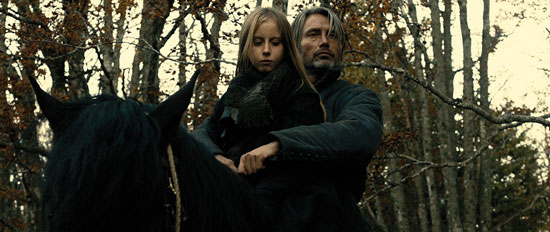
Adapted from Heinrich von Kleist’s 16th century novella, the story of Michael Kohlhaas is considered one of the first examples of modern literature. Filled with gorgeous widescreen cinematography, Age of Uprising: The Legend of Michael Kohlhaas had its world premiere at the Cannes Film Festival and stands tall as a powerful cinematic adaptation of a classic of German romanticism. Nominated for six Cesar Awards, including Best Actor for Mads Mikkelsen.
“4 Stars! A brilliantly-realized period revenge drama.” – John Bleasdale, Cine-Vue
“The formidable Mads Mikkelsen holds the sword in this old-fashioned (beautifully photographed) Robin Hood-style revenge tale. Excels in its gorgeous settings and impressive stunts.” – Jordan Mintzer, Hollywood Reporter
Starring Mads Mikkelsen, Mélusine Mayance, Delphine Chuillot. In French with English subtitles. Watch the TRAILER. Recommended.
The Airship – Das Luftschiff (1982): Franz Xavier Stannebein, a young boy at the turn of the 20th century, wants to do nothing more than fly. He carries this dream through his years at an orphanage and into adulthood as a merchant in Spain. He eventually invests everything he has into building his own version of an airship. He later meets some industrialists in Germany who want to support his idea, and they ask him to build an airfield in Spain. When he sees the Nazis use the field during the Spanish Civil War, however, he feels betrayed and goes to Germany to protest. There he is thrown into an insane asylum in Leipzig. After WWII, his grandson and other survivors of the family searches for him, only to find the empty asylum…
Based on the novel Das Luft-Schiff. Biografische Nachlasse zu den Fantasien meines Grossvaters (1974) by Fritz Rudolf Fries.
Starring Jörg Gudzuhn, Elisa Montés, Víctor Carvajal. In German with English subtitles.
Alan and Naomi (1992): Alan is a typically streetwise Brooklyn teenager of the 1940s. Naomi is a French-Jewish refugee of Nazi oppression, recently moved into the apartment above Alan’s. Ever since witnessing the murder of her father, Naomi has remained in a catatonic state. Alan’s well-meaning efforts to help the girl at first seem to do more harm than good.
But eventually the boy’s sincerity and hitherto untapped compassion win out, and the two young people form a strong, unbreakable bond. Based on the book by Myron Levoy.
Starring Lukas Haas, Vanessa Zaoui, Michael Gross. Rated PG
All Quiet on the Western Front (1979): Richard Thomas (The Waltons) stars in a powerful and dramatic adaptation of Erich Maria Remarque’s acclaimed novel, a gripping coming-of-age tale set in the shadow of war.
At the rise of World War I, German patriot Paul Baumer and his friends enlist in the Imperial German Army. In search of adventure and eager to assert the superiority of their nation, the young men endure a brutal training camp and soon find themselves face to face with the full horrors of war when they are sent to the front lines to fight… and likely die. As the conflict rages, Paul grows from an eager boy to a disillusioned man who bears the scars of war on both his body and his soul. Winner of a Golden Globe Award for Best Motion Picture Made for Television.
Starring Donald Pleasence, Ernest Borgnine, Ian Holm, Richard Thomas.
…And The Earth Did Not Swallow Him (1994): Based on Tomas Rivera’s classic novella, this is a beautiful and moving account of a family of Mexican-American migrant workers in the 1950’s.
Starring Jose Alcala, Art Bonilla, Rose Portillo. In English, Spanish, with English subtitles.
Andrei Rublev (1969): The life, times and afflictions of the fifteenth-century Russian iconographer.
Immediately suppressed by the Soviets in 1966, Andrei Tarkovsky’s epic masterpiece is a sweeping medieval tale of Russia’s greatest icon painter. Too experimental, too frightening, too violent, and too politically complicated to be released officially, Andrei Rublev has existed only in shortened, censored versions until the Criterion Collection created this complete 205-minute director’s cut special edition.
Starring Anatoliy Solonitsyn, Ivan Lapikov, Nikolay Grinko. In Russian, Italian, with English subtitles.
An Angel at My Table (1990): It’s a tale of the indomitability of the human spirit. With An Angel at My Table, Academy Award-winning filmmaker Jane Campion brings to the screen the harrowing true-life story of Janet Frame (born 1924), New Zealand’s most distinguished author. The film follows Frame along her inspiring journey, from a poverty-stricken childhood to a misdiagnosis of schizophrenia and electroshock therapy to, finally, international literary fame. Beautifully capturing the color and power of the New Zealand landscape, the film earned Campion a sweep of her country’s film awards and the Special Jury Prize at the Venice Film Festival.
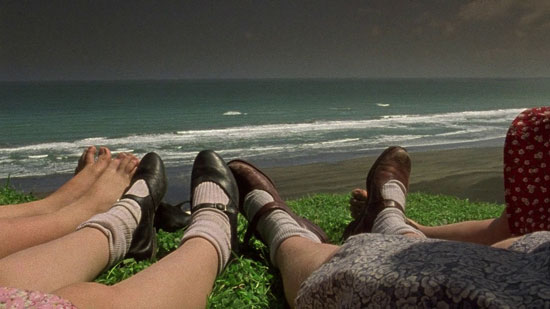
Originally produced as a television mini-series, the film, as with Frame’s autobiographies, is divided into three sections, with the lead role played by three actresses who portray Frame at different stages of her life. Set beginning in in prewar New Zealand.
“Told with a clarity and simplicity that is quietly but completely absorbing. Yes, it is visually beautiful, and, yes, it is well-acted, but it doesn’t call attention to its qualities. It tells its story calmly and with great attention to human detail and, watching it, I found myself drawn in with a rare intensity.” – Roger Ebert
Starring Alexia Keogh, Karen Fergusson, Kerry Fox. Rated R. A Willow and Thatch favorite! (Contains mature themes.)
Antonia’s Line (1995): In the aftermath of WWII, strong-willed Antonia returns to her small hometown where she has inherited her mother’s farm. Antonia, joined by her free-spirited artist daughter Danielle, ingratiate themselves with the town’s tight-knit and eccentric community. As the years unfold, love and tragedy come to Antonia and Danielle and the pair foster a vibrant circle of strong, liberated women. Set over 50 years. Winner – Academy Award for Best Foreign Language Film.
“What we remember most of all is the way Antonia’s extended family grows. Children and grandchildren, in-laws and outlaws, neighbors, friends and drifters all come to sit at her long, long dinner table, and all learn the same simple rule, which is to look for the good in others – and to not criticize those who have found a way to be happy without seriously bothering anybody.” – Roger Ebert
Starring Jan Decleir, Veerle van Overloop, Willeke van Ammelrooy. In Dutch with English subtitles. Rated R. Watch the TRAILER. A Willow and Thatch favorite!
Anton Chekhov’s The Duel (2010): In Anton Chekhov’s The Duel, escalating animosity between two men with opposing philosophies of life is played out against the backdrop of a decaying seaside resort along the Black Sea coast.
Laevsky is a dissipated romantic given to gambling and flirtation. He has run off to the sea with beautiful, emotionally empty, Nadya, another man’s wife. Laevsky has now grown tired of her, but two obstacles block his route to escape: he is broke, and he faces the absolute enmity of Von Koren, an arrogant zoologist and former friend who can no longer tolerate Laevsky’s irresponsibility. Soon Laevsky confronts Von Koren, accusing him of meddling in his affairs, but Von Koren maneuvers a criticism Laevsky makes of their mutual friend, Dr. Samoylenko, into a challenge to a duel. Utterly discombobulated and honor bound, Laevsky agrees to this absurdity — a duel it shall be! A duel as comically inadvertent as it is inevitable.
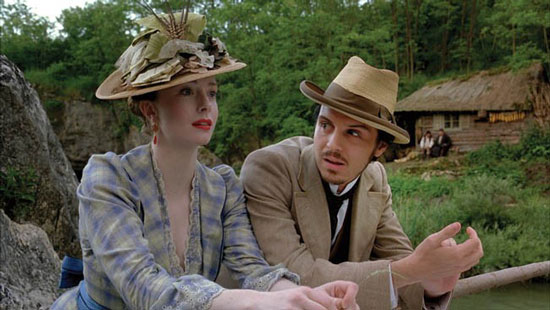
4 Stars! “Deft, droll and languorously sexy…. This film is indeed something like a miracle.” – Michael Phillips, Chicago Tribune
“At the heart of this film, which goes to the heart of Chekhov, is a deep understanding of human nature, human strength and human need. This is smart, inspired, no-fuss entertainment.” – San Francisco Chronicle
“Adultery, betrayal, blackbail, drunken antics…the most successful literary adaptation I’ve seen since…Lady Chatterley.” – The Village Voice
Starring Andrew Scott, Fiona Glascott, Niall Buggy, Nicholas Rowe, Tobias Menzies. Watch the TRAILER. Recommended!
The Apu Trilogy (1955 – 59): Two decades after its original negatives were burned in a fire, Satyajit Ray’s breathtaking milestone of world cinema rises from the ashes in a meticulously reconstructed new restoration. The Apu Trilogy brought India into the golden age of international art-house film, following one indelible character, a free-spirited child in rural Bengal who matures into an adolescent urban student and finally a sensitive man of the world.
These delicate masterworks–Pather Panchali (Song of the Little Road, set in rural Bengal, in the 1910s), Aparajito (The Unvanquished, set in 1920), and Apur Sansar (The World of Apu)–based on two books by Bibhutibhusan Banerjee, were shot over the course of five years, and each stands on its own as a tender, visually radiant journey. They are among the most achingly beautiful, richly humane movies ever made–essential works for any film lover.
Starring Kanu Bannerjee, Karuna Bannerjee, Subir Banerjee, Smaran Ghosal, Kamala Adhikari, Lalchand Banerjee. In Bengali with English subtitles. Recommended.
A Rose For Emily (1983): This short film is a superbly-crafted dramatization of Nobel Prize-winning author William Faulkner’s first nationally published short story, this is the tale of an indomitable Southern woman who clutched the past so resolutely that life itself is denied. The film is at once a twentieth century Gothic tale, a psychological study of isolation, and a history of the decay of the old order.
Starring Anjelica Huston, John Carradine.
A Slave Of Love (1976): Hailed by the New York Times as “An unexpected masterpiece,” A Slave of Love is a witty and haunting film about moviemaking from the acclaimed Russian director Nikita Mikhalkov (Burnt by the Sun).
Within the sun-drenched beauty of the Crimean summer, a Russian movie crew grapples with film shortages, Tsarist secret police scrutiny, and their own dysfunctional dynamic to churn out one more silent melodrama before the revolution in Moscow consumes the nation. While awaiting the arrival of her missing co-star husband, silent film diva Olga (a character inspired by tragic real-life screen siren Vera Kholodnaya), a star so luminous that dissidents risk arrest to see her latest film “Slave of Love,” becomes enmeshed in a romance with handsome young cameraman Pototsky. But what begins as a casual dalliance becomes an awakening as Olga’s lover reveals his true allegiance. Ultimately, their romance leads Olga to an unforgettable high-speed date with destiny that unites movie heroism with historic martyrdom. Set in 1918.
In 1978 the film was voted one of the best foreign films by the National Board of Review, and was voted the 3rd best foreign film of the year at both the Los Angeles Film Critics Association Awards and New York Film Critics Circle Awards.
Starring Elena Solovey, Rodion Nahapetov, Aleksandr Kalyagin. English, Russian, with English subtitles. Recommended!
A Tale of Two Cities (1980): This Golden Globe and Emmy nominee is a glorious telling of Dickens’ tale of passion, intrigue, and revolution.
Charles Dickens’ A TALE OF TWO CITIES comes to magnificent life in a lavish adaptation of the literary classic set against the backdrop of the French Revolution. Chris Sarandon takes on a dual role as French aristocrat Charles Darnay and London lawyer Sydney Carton – both of whom are in love with the beautiful Lucie (Alice Krige). As the world around them grows more and more uncertain, one of them will make the ultimate sacrifice in the name of love and honor.
Starring Chris Sarandon, Kenneth More, Peter Cushing, Alice Krige.
Augustine (2013): The powerful and darkly sensual drama Augustine is based on the true story of the unusual relationship that developed between Dr. Jean-Martin Charcot, the pioneering 19th century French neurologist and mentor to Sigmund Freud, and his star teenage patient.
In Belle Epoque Paris, 19-year-old kitchen maid Augustine suffers an inexplicable seizure that leaves her partially paralyzed and is shipped off to an all-female psychiatric hospital specializing in the then-fashionable ailment of ‘hysteria’. Augustine captures the attention of renowned neurologist Dr. Charcot (Vincent Lindon) after she has another attack that appears to give her intense physical pleasure. Intrigued, he begins using her as his principal subject, hypnotizing her in front of his fellow doctors. As Augustine displays her spectacular fits in lecture halls, the lines between doctor and patient become blurred, radically impacting the course of both of their lives. Chronicling one woman’s sexual awakening against the backdrop of Victorian psychology and social repression, director Alice Winocour’s auspicious feature film debut stars 27 year-old French recording artist Soko in a breakout performance.
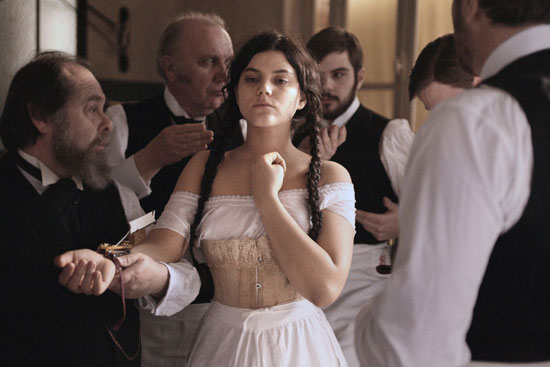
“Absorbingly sensuous period drama from an exciting new French writing/directing talent.” – The Hollywood Reporter
“A coolly febrile study of madness, Victorian sexual politics and power. The complex relationship between 19th-century neurologist Jean-Martin Charcot and of the most famous ‘hysterics’ he treated is charted with intelligent nuance.” – Variety
“A slyly feminist fable.” – The Wall Street Journal
Starring Chiara Mastroianni, Soko, Vincent Lindon. In French with English subtitles. Recommended.
Au Revoir les Enfants (1987): In 1943, Julien is a student at a French boarding school. When three new students arrive, including Jean Bonnett, Julien believes they are no different from the other boys. What Julien doesn’t know is that the boys are actually Jews who are evading capture by the Nazis. While Julien doesn’t care for Jean at first, the boys develop a tight bond — while the head of the school, Père Jean, works to protect the boys from the Holocaust.
Based on events from writer-director Louis Malle’s own childhood, the film is a subtle, precisely observed tale of courage, cowardice, and tragic awakening.
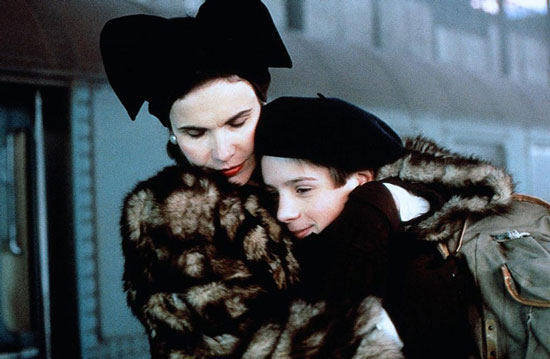
“It’s a work that has the kind of simplicity, ease and density of detail that only a film maker in total command of his craft can bring off, and then only rarely.” – New York Times
Starring Francine Racette, Gaspard Manesse, Raphael Fejtö, Philippe Morier-Genoud. In French with English subtitles. Rated PG. A Willow and Thatch favorite!
The Autobiography of Miss Jane Pittman (1974): Beginning during the racial turmoil of 1960s Louisiana, 110-year-old ex-slave Jane Pittman (Cicely Tyson) grants an interview to a persistent journalist and relates the remarkable story of her life. Orphaned early, she toils on a plantation until a chance meeting with a white Union soldier named Brown changes her outlook. Jane’s emancipation marks only the beginning of an arduous and heartbreaking odyssey, framed by the horrors of slavery and the justice of the civil rights movement. This Television adaptation on the famous novel won 9 Emmy Awards.
Starring Cicely Tyson, Katherine Helmond, Michael Murphy, Odette, Richard Dysart. Rated TV-PG. Watch the TRAILER.
A Year Of The Quiet Sun (1984): Golden Lion (Best Film) winner at the 1984 Venice Film Festival, this quietly brilliant gem is set in Poland in 1946 during the aftermath of WWII.
American soldier Norman serves as a driver for a United Nations war-crimes commission examining Nazi mass graves. Norman falls in love with war widow Emilia and, in spite of language and cultural differences, a meaningful romance blossoms between them. But Emilia’s loyalty to her ailing mother threatens to separate the couple when Norman finally receives his papers to return home.
“They do not speak each other’s languages, but they fall in love wordlessly, and quickly.” – Roger Ebert
Starring Maja Komorowska, Scott Wilson, Hanna Skarzanka. In English, Polish, with English subtitles. Rated PG
Balzac and the Little Chinese Seamstress (2002): Based on the best-selling novel set during China’s cultural revolution, this acclaimed film is about two young men, university students, who are sent to a remote mountain village for a Maoist re-education, to purge them of their decadent Western education. Amid the back-breaking work and stifling ignorance of the community, the local beauties are the only respite from their miserable life. But none compare to the granddaughter of the region’s tailor. With a secret cache of forbidden books, they set about to woo her. Set beginning in the late 1960s.
“(The film) testifies to the liberating power of books, Western novels in particular. (In addition to Balzac, the film nods appreciatively at Flaubert’s “Madame Bovary” and Dumas’s “Count of Monte Cristo,” which is a favorite of the Seamstress’s grandfather.) It associates them with love, pleasure and individuality, which are all anathema to regimes that try to impose an abstract ideal of collective human perfection on their subjects.” – New York Times
Starring Chen Kun, Liu Ye, Zhou Xun. In Mandarin with English subtitles. Recommended!
Beloved Sisters (2014): In this sweeping yet intimate romantic drama, which is also Germany’s official submission to the Academy Awards for Best Foreign Language Film, acclaimed director Dominik Graf illuminates the lives of two bold young women and one of classical literature’s most celebrated figures with charm and contemporary energy.
BELOVED SISTERS depicts the unconventional romance between two aristocratic sisters and a rebellious poet who took the European literary world by storm in the late eighteenth century. As the German Enlightenment flourishes in Weimar, vibrant Caroline von Beulwitz finds herself in an unhappy marriage to provide for her mother and shy younger sister Charlotte von Lengefeld.
When both sisters fall for outspoken writer Friedrich Schiller, their desire ignites a journey of shared passion and creativity. Charlotte and Schiller marry so that the lovers may pursue their menage a trois under the guise of convention, but as Caroline reveals herself to be a talented author in her own right, the trio’s fragile equilibrium is threatened and the sisters’ once unbreakable connection is irrevocably changed. Winner of Best Cinematography at the Bavarian Film Awards and nominated for the Golden Berlin Bear at the Berlin International Film Festival.
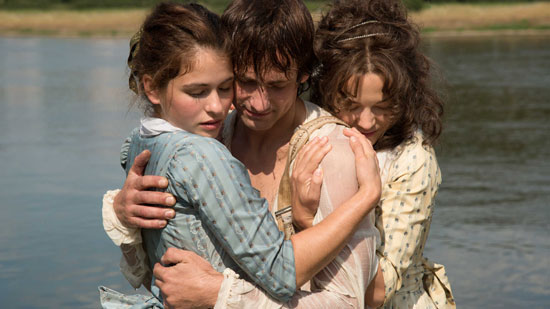
“A surprisingly brisk, absorbing film, shot and cut with the speed of a thriller.” – Bilge Ebiri, New York Magazine
“Think of it as Graf’s ‘The Age of Innocence,’ a sumptuous phasing through the textures that entrap those unfit for times defined by emotional repression. See it when you most need it and this film might change your life.” – Scout Tafoya, RogerEbert.com
Starring Florian Stetter, Hannah Herzsprung, Henriette Confurius. In German with English subtitles. Watch the TRAILER. A Willow and Thatch favorite!
Bernice Bobs Her Hair (1976): It’s the hot summer of 1919. Visiting her cousin Marjorie (Veronica Cartwright), sweet-but-dull Bernice (Shelley Duvall) is transformed into a smooth-talking man-trap by her vampish kin. However, the “make-over” works too well, Bernice becomes the belle of the ball, captivating every boy’s interest…even Marjorie’s boyfriend Warren (Bud Cort). The now worldly Bernice has the last laugh…a clever and ironic twist. One of the best screen translations of F. Scott Fitzgerald’s literary work, Bernice also includes the delightful supporting role performances of Dennis Christopher and Polly Holliday.
Starring Bud Cort, Veronica Cartwright, Shelly Duvall.
The Best Intentions – Den goda viljan (1992): Swedish master Ingmar Bergman penned this loving tribute to his parent’s epic romance. In 1909, poor, idealistic theology student Henrik Bergman falls in love with Anna Akerbloom, the intelligent, educated daughter of a rich family in Uppsala. After their wedding Henrik becomes a priest in the north of Sweden. Urbane Anna can’t stand living in the rural county and grows increasingly restless. She returns to Uppsala and the couple’s love and commitment are put to the test. Set between 1909 and 1918.
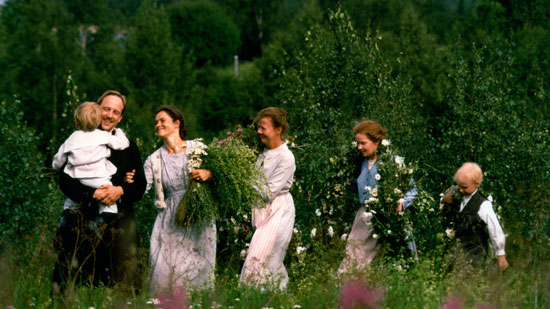
“An epic story of mismatched love shaped in the most intimate terms, the Ingmar Bergman-scripted “The Best Intentions” packs a sustained emotional wallop that lightens its three-hour span. Focusing on the early years of the Swedish helmer’s strong-willed parents, it’s a powerful confirmation of the talents of Danish-born director Bille August, who hit the international limelight three years ago with the gritty Oscar-winning costumer “Pelle the Conqueror.”” – Variety
Starring Lena Endre, Max von Sydow, Pernilla August, Samuel Froler. In Swedish with English subtitles. Watch the TRAILER. Recommended.
Black Jack (1979): When honest young Tolly is forced on the run with ‘Black Jack’, a villainous ruffian, adventure and mishap are never far away. As the two enter a world of body-snatchers, private lunatic asylums and travelling fairs they find friendship in the most unlikely places. Based on Leon Garfield’s popular novel, Ken Loach’s Black Jack is a dark and complex adventure film set in the 18th Century. With Chris Menges’ beautiful 16MM photography (interiors were shot in 35MM), enchanting performances by its charismatic young cast and Loach’s gentle, observational style – seen in his earlier feature Kes (1969).
Starring Jean Franval, Louise Cooper, Stephen Hirst. Watch the TRAILER.
Black Orpheus (1959): Period-inspired. Winner of both the Academy Award for best foreign-language film and the Cannes Film Festival’s Palme d’Or, Marcel Camus’ Black Orpheus (Orfeu negro) brings the ancient Greek myth of Orpheus and Eurydice to the twentieth-century madness of Carnival in Rio de Janeiro. With its eye-popping photography and ravishing, epochal soundtrack, Black Orpheus was an international cultural event, and it kicked off the bossa nova craze that set hi-fis across America spinning.
Starring Breno Mello, Lourdes de Oliveira, Marpessa Dawn. In Portuguese with English subtitles.
The Blue Kite (1993): The most acclaimed and controversial film of the new Chinese cinema, THE BLUE KITE traces the fate of a Beijing boy and his family as they experience the political and social upheavals in 1950s and ’60s China. One of Roger Ebert “Great Movie” picks and in the “1001 Movies You Must See Before You Die,” edited by Steven Schneider.
“The power of his film comes from its resolutely human focus; we get a palpable sense of what it was like to live on Dry Well Lane in those days, to share food and fuel, to play gladly in the schoolyard, to know by looking out the window who was coming or going. It is photographed with remarkable gracefulness, colors and compositions finding beauty in the lives of these people, and especially in their faces.” – Roger Ebert
Starring Tian Yi, Wenyao Zhang, Xiaoman Chen. In English, Mandarin, with English subtitles.
Breaker Morant (1980): At the turn of the twentieth century, three Australian army lieutenants are court-martialed for alleged war crimes committed while fighting in South Africa. With no time to prepare, an Australian major, appointed as defense attorney, must prove that they were just following orders and are being made into political pawns by the British imperial command.
Director Bruce Beresford garnered international acclaim for this riveting drama set during a dark period in his country’s colonial history, and featuring passionate performances by Edward Woodward, Bryan Brown, and Jack Thompson; rugged cinematography by Donald McAlpine; and an Oscar-nominated script, based on true events. Set in 1901, in South Africa, at the end of the Boer War, focusing on the trial.
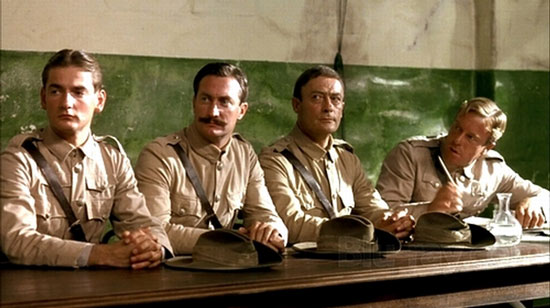
“Genuinely, surprisingly affecting. And unspeakably sad.” – New York Times
Starring Edward Woodward, Jack Thompson, John Waters. Rated PG. Recommended.
Bride Flight (2008): A lavish, award-winning romantic period drama that charts the lives of three women who escape the gloom of post-WWII Holland for what they hope will be a better life in New Zealand. Ada, the shy but sensual farm girl, Marjorie, who dreams of a big family, and Esther, a Holocaust survivor who aspires to be a fashion designer, become fast friends during the long flight taking them to their waiting husbands, who have already settled in Christchurch.
“Lavishly entertaining…Fascinating, beautifully acted and magnificently photographed.” – Rex Reed, NY Observer
Starring Anna Drijver, Elise Schaap, Karina Smulders, Pleuni Touw, Rutger Hauer, Waldemar Torenstra. In Dutch, English, with English subtitles. Rated R. Watch the TRAILER. Recommended.
The Bridge (1959): Bernhard Wicki’s astonishing The Bridge was the first major antiwar film to come out of Germany after World War II, as well as the nation’s first postwar film to be widely shown internationally, even securing an Oscar nomination. Set near the end of the conflict, it follows a group of teenage boys in a small town as they contend with everyday matters like school, girls, and parents, before enlisting as soldiers and being forced to defend their home turf in a confused, terrifying battle. This expressively shot, emotionally bruising drama dared to humanize young German soldiers at a historically tender moment, and proved influential for the coming generation of New German Cinema auteurs.
Starring Folker Bohnet, Fritz Wepper, Michael Hinz. In German with English subtitles.
The Bronte Sisters (1979): In a remote English village of the 1840s, three sisters – Charlotte, Emily and Anne – live a simple life with their brother, Branwell, and their father, the pastor Patrick Bronte. Although compelled to take up posts as governesses or private tutors, the four loyal siblings continue to nurture their artistic aspirations. Branwell’s poems are beginning to interest other writers and each of the three sisters has published a successful novel.
But then tragedy strikes. After a disastrous love affair with an older woman, Branwell succumbs to drugs, drink and depression. Soon after his death, Emily and Anne are struck down by tuberculosis. Will Charlotte’s lot be any better…?
Starring Isabelle Adjani, Isabelle Huppert, Marie-France Pisier. In French with English subtitles. Watch the TRAILER.
Camille Claudel 1915 (2013): Winter, 1915. Confined by her family to an asylum in the South of France – where she will never sculpt again – the chronicle of Camille Claudel’s reclusive life, as she waits for a visit from her brother, Paul Claudel.
Starring Juliette Binoche, Jean-Luc Vincent, Robert Leroy. In English, French, with English subtitles. Watch the TRAILER.
Carol’s Journey (2002): Carol, a 12-year-old Spanish-American girl from New York, travels with her mother to Spain in the spring of 1938, at the height of the Civil War. Separated from her beloved father, Carol arrives in her mother’s home village and transforms the secretive family environment. Her innocence and rebellious nature drive her at first to reject a world that is at once new and foreign, but she soon journeys into adulthood through a friendship with Maruja, the village teacher, and a young local boy, Tomiche. However, as conditions in the village deteriorate, her eyes are opened to a shocking new world of excitement, intrigue and danger.
Starring Álvaro de Luna, Clara Lago, Juan José Ballesta, María Barranco. In Spanish with English subtitles.
The Cherry Orchard (1999): Anton Chekhov’s THE CHERRY ORCHARD is the timeless story of an aristocratic Russian family torn apart by buried secrets and changing times. Stars Alan Bates and Charlotte Rampling.
Starring Alan Bates, Charlotte Rampling, Katrin Cartlidge. In English, French, with English subtitles.
Children of Paradise (1945): Poetic realism reached sublime heights with Children of Paradise, widely considered one of the greatest French films of all time. This nimble depiction of nineteenth-century Paris’s theatrical demimonde, filmed during World War II, follows a mysterious woman (Arletty) loved by four different men (all based on historical figures): an actor, a criminal, a count, and, most poignantly, a mime (Jean-Louis Barrault, in a longing-suffused performance for the ages). With sensitivity and dramatic elan, director Marcel Carne and screenwriter Jacques Prevert resurrect a world teeming with hucksters and aristocrats, thieves and courtesans, pimps and seers. And thanks to a major new restoration, this iconic classic looks and sounds richer and more detailed than ever.
Starring Arletty, Jean-Louis Barrault, Pierre Brasseur. In French with English subtitles. Recommended.
Chopin: Desire for Love (2012): A tangled web of unruly passion lies at the center of this drama, chronicling the stormy affair between the great piano virtuoso Frederic Chopin and the flamboyant feminist writer Aurore Dupin, who called herself George Sand. Academy Award nominated Jerzy Antczak directs this sweeping portrayal of the famed composer and his intense but hurtful relationship with George Sand and her children.
Chopin’s Music known and loved by millions worldwide provides a powerful score that underlines the drama. The world recognized Yo-Yo-MA (cellist), Emanuel Ax (pianist), Yukio Yokoyama (pianist), Janusz Olejniczak (pianist), Pamela Frank (violin), Vadim Brodsky (violin) use their talents to brilliantly perform Chopin’s music.
Starring Adam Woronowicz, Danuta Stenka, Piotr Adamczyk. In English, French, Polish, with English subtitles. Rated R
The Chosen (1980): Set in the Brooklyn of the 1940s, the film elucidates the friendship between two young Jews of differing factions. Danny is Hassidic, while Reuven is a Zionist. Though separated ideologically, the boys find a common bond through their love of stickball.
Based on a novel by Chaim Potok set in the latter years of World War II, The Chosen has become an annual Hannukah-season TV attraction in many cities; years after its release, the film served as the basis for a short-lived Broadway musical.
“The Chosen is a first-rate adaptation of Chaim Potok’s novel of friendship between two young Jewish men of widely different religio-cultural upbringings and their individual relationships with strong fathers.” – Variety
Starring Barry Miller, Maximilian Schell, Robby Benson, Rod Steiger, Ron Rifkin. In English, Hebrew, with English subtitles. Rated PG. Recommended.
Closely Watched Trains (1966): At a village railway station in occupied Czechoslovakia, a bumbling dispatcher’s apprentice longs to liberate himself from his virginity. Oblivious to the war and the resistance that surrounds him, this young man embarks on a journey of sexual awakening and self-discovery, encountering a universe of frustration, eroticism, and adventure within his sleepy backwater depot. Wry and tender, Academy Award(tm)-winning Closely Watched Trains is a masterpiece of human observation and one of the best-loved films of the Czech New Wave. Set during World War II.
Starring Josef Somr, Václav Neckár, Vlastimil Brodsky. In Czech, English, German, with English subtitles. Note: Willow and Thatch found this to be a bit heavy at times, but enjoyed it overall.
Danton (1983): Gerard Depardieu and Wojciech Pszoniak star in Andrzej Wajda’s powerful, intimate depiction of the ideological clash between the earthy, man-of-the-people Georges Danton and icy Jacobin extremist Maximilien Robespierre, both key figures of the French Revolution. By drawing parallels to Polish “solidarity,” a movement that was being quashed by the government as the film went into production, Wajda drags history into the present. Meticulous and fiery, Danton has been hailed as one of the greatest films ever made about the Terror.
Starring Anne Alvaro, Gérard Depardieu, Wojciech Pszoniak. In French with English subtitles. Recommended!
Death of a Salesman (1985): During the post-war boom period of the late ’40s, Willy Loman is an aging, traveling salesman, who despairs that his life his been lived in vain. Facing dispensability and insignificance in a heated, youthful economy, Willy is not ready to part with his cherished fantasies of an America that admires him for personable triumphs in the marketplace.
But the reality is far more difficult than that, and the measure of Willy’s self-delusion and contradictions is found in his two sons. One, Harold, is a ne’er-do-well gliding on inherited hot air and repressed feelings, and the other, Biff, a mousy, retiring sort unable to reconcile the difference between his father’s desperate impersonation of success and the truth.
Starring Charles Durning, Dustin Hoffman, John Malkovich, Kate Reid, Stephen Lang. Rated PG. Award-winning and recommended!
The Deep Blue Sea (2011): Master chronicler of post-War England, Terence Davies directs Rachel Weisz as a woman whose overpowering love threatens her well-being and alienates the men in her life.
In a deeply vulnerable performance, Rachel Weisz plays Hester Collyer, the wife of an upper-class judge (Simon Russell Beale) and a free spirit trapped in a passionless marriage. Her encounter with Freddie Page (Tom Hiddleston), a troubled former Royal Air Force pilot, throws her life in turmoil, as their erotic relationship leaves her emotionally stranded and physically isolated. The film is an adaptation of British playwright Terence Rattigan’s 1952 play, featuring one of the greatest roles for an actress in modern theatre.
“That too is what “The Deep Blue Sea” is about: a woman’s attempt to live by the dictates of her heart rather than the expectations of society… And so, to put the matter perhaps more abstractly than such a sensual film deserves, it is about the fate of untameable, irrational desire in a world that does not seem to have a place for it.” – New York Times
Award-winning, adapted from a play by Terence Rattigan, and set around 1950.
Starring Rachel Weisz, Simon Russell Beale, Tom Hiddleston. Watch the TRAILER. Recommended.
Do You Remember Dolly Bell? (1981): A thoughtful and moving story of a sixteen year old boy who learns to deal with the unique difficulties of becoming an adult in Sarajevo in the 1960’s. Young Dino Zolje grows up under the shadow of his good, but ailing father and gets attracted by the world of small time criminals. Then comes Dolly Bell, lovely cabaret girl that turns his world upside down.
Starring Slavko Stimac, Slobodan Aligrudic, Ljiljana Blagojevic. In English, Serbo-croatian, with English subtitles.
Dreaming Of Space – Kosmos kak predchuvstvie (2005): The USSR, 1957 – a time of hope and genuine belief that the future will be bright. The Soviet satellite is conquering space, and on the Earth, in a little port city, the bright beaming eyes of Konyok and Lara – a naive restaurant cook and his waitress girlfriend – follow the movement of the satellite with hope and excitement. Their romance is disrupted by the appearance of a mysterious stranger, Gherman. He knows for sure that one can not run away from this country. One can only fly. Or swim. When Lara is smitten by Gherman’s mysterious cynicism a lover’s triangle starts to emerge.
Starring Eugeny Mironov, Eugeny Tsyganov, Irina Pegova. In Russian with English subtitles.
The Duck Hunter (2010): Four Italian friends chase their hopes and dreams at the dawn of World War II. But the tragedy and upheavals of the time bring changes that will affect all of them forever.
Year 1942. The front of the war is still far and in a little provincial town, between the south of Modena and the river Po, Mario and his frien- ds live their youth free and easy. Each of them has his or her own dream to fulfill: Loris, the Casanova, hopes one day he’ll manage to go to Paris. In the meantime he begins a relationship with Luisa, who’s engaged to Archimede, a young fascist.
Oreste the motorcyclist dreams of a new motorcycle. Gino is the village fool. He lives alone, with a canary and would like to become mayor. Mario is the only one to be married and has a dau- ghter, Alice. He dreams of giving her an old piano, for her to study music, just like he would’ve loved to do as a child. But the coming of the war and the mishaps of life will very soon end up to overwhelm their destinies.
Starring Federico Botti, Francesca Paltrinieri. In Italian with English subtitles.
Effi Briest (1974): A young woman is married to a much older man and begins a flirtation with one of his close friends that leads to dire consequences. Set in the nineteenth century and based on the famous 1893 German novel by Theodor Fontane.
Rainer Werner Fassbinder’s adaptation of a late 19th-century novel by Theodor Fontane is an austere period piece that may be the least characteristic of the German director’s films. The titular heroine, played by Fassbinder regular Hanna Schygulla, is a 17-year-old girl forced into a loveless marriage with an old count. Living as the aristocrat’s trophy wife, Effi endures her provincial existence unhappily. Her circumstances lead to a brief affair with a young lieutenant that attracts the attention of the townspeople, but not her unsuspecting husband’s. Years later, however, the count discovers the love letters between his wife and her lover. As dictated by convention, he challenges the lieutenant to a duel and throws his wife out of their home. The shamed Effi is forced to live by herself, shunned by society and spurned by her family. Effi eventually returns to her unsympathetic parents, who reluctantly take in their disgraced daughter.
Starring Hanna Schygulla, Ulli Lommel, Wolfgang Schenck. In German with English subtitles.
Elective Affinities – Die Wahlverwandtschaften (1973): During the Napoleonic Wars, Baron Eduard and his wife Charlotte live an reclusive and idyllic life together in an old castle. Driven to boredom by isolation, Eduard invites his friend Captain Otto to come stay, and Charlotte decides to bring her foster daughter Ottilie back from boarding school. Complex and passionate affinities are soon ignited between the four people, leading to tragic consequences. This film, based on Goethe’s classic novel, foregrounds the social implications of personal relationships.
“…intricately and intelligently constructed.” – Filmspiegel
Starring Dieter Birr, Claus Dobberke, Volkmar Kleinert, Jana Plichtová, Christine Schorn, Horst Schulze, Hilmar Thate, Beata Tyszkiewitz, Magda Vášáryová, Gerry Wolff. In German with English subtitles.
Fort McCoy (2011): At the height of World War II, Frank Stirn moves his family to become a barber at Fort McCoy, an American Army base and Nazi POW camp in Wisconsin. Based on a true story.
Eric Stoltz gives one of his most powerful performances as Frank Stirn, who moves with his family to become a barber for the American Army and POW camp at Fort McCoy, Wisconsin, in the summer of 1944. Embittered that he cannot fight, Frank must take a stand when a Nazi SS Officer threatens his wife (Kate Connor, playing her real-life grandmother). Her Catholic sister falls for a Jewish soldier haunted by the battle of Monte Cassino and the death of his best friend. Camryn Manheim is their audacious friend who encourages the couple, while Seymour Cassel is the priest who cannot. Frank’s daughter befriends a German prisoner boy during this magical summer, but war still finds its victims even thousands of miles from the battlefields in rural America.
Starring Andy Hirsch, Brendan Fehr, Camryn Manheim, Eric Stoltz, Kate Connor, Lyndsy Fonseca, Seymour Cassel. Rated R
Galileo: On the Shoulders of Giants (1998): This film is about Galileo Galilei (Michael Moriarty from the TV series “Law and Order”) who was an Italian astronomer, physicist, engineer, philosopher, and mathematician who played a major role in the scientific revolution of the seventeenth century. He has been called the “father of observational astronomy”, the “father of modern physics”, and the “father of science”.
In this historical drama, Galileo is on the verge of uncovering some of the mysteries of the universe when he’s interrupted by some of life’s more mundane problems: money, an idle, unemployed brother (Tony Nardi) and a jealous rival (Louis del Grande). Fortunately, he finds support from an unexpected source, the pampered son of the powerful Medici family. Under Galileo’s tutelage, Cosimo de Medici (Kenny Vadas) finds that in searching for the stars, one has to have his feet firmly on the ground. The stakes mount as Galileo and his young protege struggle for intellectual freedom while challenging the scientific authorities in Padova. The drama set in 1605 leads to intrigue while Galileo takes serious risks on the path to the invention of the first telescope. An Emmy Award Winner.
Starring Michael Moriarty, Kenny Vadas, Louis Del Grande.
See the other historical dramas from Victory Studios like Einstein: Light to the Power of 2, Monet: Shadow and Light, Liszt’s Rhapsody, Strauss: The King of 3/4 Time, Mary Cassatt: American Impressionist, Bizet’s Dream, Bach’s Fight for Freedom, Degas and the Dancer, Handel’s Last Chance, Leonardo: A Dream of Flight, Rossini’s Ghost, Edison: The Wizard of Light, Winslow Homer: An American Original, Goya: Awakened in a Dream, Rembrandt: Fathers and Sons, Newton: A Tale of Two Isaacs, Marie Curie: More than Meets the Eye.
Germinal (1993): Winner of France’s prestigious Cesar Awards for “Best Cinematography” and “Best Costume Design” this 1993 French epic film is based on a novel by Emile Zola.
During the Second Napoleonic Empire, Etienne Lantier finds employment as a coal miner in the northern French town of Montsou. He immediately encounters misery and degradation in the appalling conditions of the mine. There he meets men as unscrupulous as Chaval and, conversely, as generous as Maheu. In fact, a whole range of suffering humanity, laboring under the curse of capitalism.
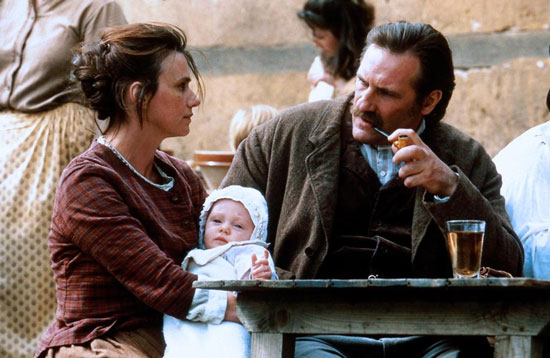
Starring Gérard Depardieu, Miou-Miou, Renaud. In French with English subtitles. Watch the TRAILER. Recommended!
Getting Of Wisdom (1978): A rebellious youngster has difficulty adjusting to her new life at a strict Victorian boarding school.
Oscar-nominated director Bruce Beresford (Driving Miss Daisy, Tender Mercies) crafts a tender coming-of-age tale that introduces one of Australian literature’s most beloved characters to the screen, Laura Tweedle Rambotham (Susannah Fowle). Based on the immortal best seller by Henry Handel Richardson, and boasting a riveting lead performance from Fowle, THE GETTING OF WISDOM is an Australian cinema classic. Set in the 1890s.
Starring Susannah Fowle, Hilary Ryan, Terence Donovan. Recommended!
Goya’s Ghosts (2006): Directed by Oscar-winner Milos Foreman, “Goya’s Ghosts” is a sweeping historical epic, told through the eyes of celebrated Spanish painter Francisco Goya (Stellan Skarsgard). Set against the backdrop of political turmoil at the end of the Spanish Inquisition and start of the invasion of Spain by Napoleon’s army. Brother Lorenzo (Javier Bardem), an enigmatic, cunning member of the Inquisition’s inner circle who becomes infatuated with Goya’s teenage muse, Ines (Natalie Portman), when she is falsely accused of heresy and sent to prison.
“An extraordinarily beautiful film that plays almost like an excuse to generate its images. Like the Goya prints being examined by the good fathers of the Inquisition in the opening scene, the images stand on their own, resisting the pull toward narrative, yet adding up to a portrait of grotesque people debased by their society.” – RogerEbert.com
Starring Javier Bardem, Natalie Portman, Randy Quaid, Stellan Skarsgard. Rated R. Watch the TRAILER.
Half of a Yellow Sun (2014): Olanna (Thandie Newton) and Kainene (Anika Noni Rose) are glamorous twins from a wealthy Nigerian family. Upon returning to a privileged city life in newly independent 1960s Nigeria after their expensive English education, the two women make very different choices. Olanna shocks her family by going to live with her lover, the “revolutionary professor” Odenigbo (Chiwetel Ejiofor) and his devoted houseboy Ugwu in the dusty university town of Nsukka; Kainene turns out to be a fiercely successful businesswoman when she takes over the family interests, and surprises even herself when she falls in love with Richard, an English writer. Preoccupied by their romantic entanglements, and a betrayal between the sisters, the events of their life seem to loom larger than politics. However, they become caught up in the events of the Nigerian civil war, in which the lgbo people fought an impassioned struggle to establish Biafra as an independent republic, ending in chilling violence which shocked the entire world.
Starring Anika Noni Rose, Chiwetel Ejiofor, Thandie Newton, Joseph Mawle, John Boyega.
Hamsun (1996): In this epic story of love and treason, screen legend Max von Sydow gives a career-crowning performance as Knut Hamsun, Norway’s controversial Nobel Laureate. Hamsun is his country’s most beloved writer. But with the shadow of Nazism quickly darkening Europe, Hamsun and his wife Marie embrace Hitler – who sees Hamsun’s support as the surest way to win over the Norwegian people. Before long Hamsun and Marie are engulfed not only in Hitler’s war, but also in their own turbulent relationship, and must face the angry wrath of a betrayed nation.
Starring Anette Hoff, Asa Soderling, Edgar Selge, Erik Hivju, Ernst Jacobi, Ghita Nørby, Max von Sydow, Sverre Anker Oudsal. In Danish, Norwegian, Swedish, with English subtitles.
Heartland (1980): A woman arrives at the property of a reclusive Scottish famer to work as his housekeeper. Paid near-starvation wages, she continues working day and night, hoping to use her savings to ensure a bright future for her 10-year-old daughter.
Touched by her diligence, the farmer slowly falls in love with the woman, and after seeing her and her child through the torturous Wyoming winter, he marries her – but their union gets off to a shaky start and threatens to buckle, thanks to several unforeseen casualties.
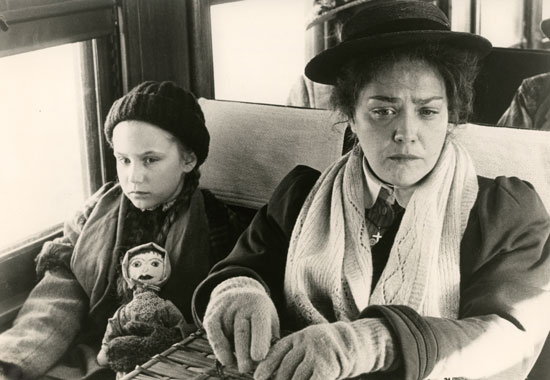
Starring Amy Wright, Barry Primus, Conchata Ferrell, Lilia Skala, Megan Folsom, Rip Torn. Highly recommended and a Willow and Thatch favorite! Read Willow and Thatch’s review of the Edwardian era period drama here.
Hester Street (1975): Gitl and her son arrive on the Lower East side of New York in 1896 to join her husband Jake. While Jake, who has job in a sweatshop and an English-speaking girlfriend, has completely embraced America, Gitl clings to her old country ways. Jake is embarrassed to be seen with her as he struggles to assimilate by shedding his ethnic heritage. Gitl finds a way to become victor instead of victim.
By turns heartbreaking, comic, and sharply observed, this remarkable film won Carol Kane an Academy Award nomination for Best Actress in 1975.
Starring Carol Kane, Dorrie Kavanaugh, Mel Howard, Steven Keats. Recommended! An unexpected pleasure.
The Home and the World (1984): Both a romantic-triangle tale and a philosophical take on violence in times of revolution, The Home and the World (Ghare Baire), set in early twentieth-century Bengal, concerns an aristocratic but progressive man who, in insisting on broadening his more traditional wife’s political horizons, drives her into the arms of his radical school chum. Satyajit Ray had wanted to adapt Rabindranath Tagore’s classic novel to the screen for decades. When he finally did in 1984, he fashioned a personal, exquisite film that stands as a testament to his lifelong love for the great writer. Set in 1908.
“The suspense in the movie and the drama all form around the changing character of Bimala, the wife. We see her move from total seclusion to the ability to act recklessly and with courage. The character is played by Swatilekha Chatterjee, a gravely beautiful, full-figured woman, whose eyes are able to suggest great passions inside a cautious exterior.” – Roger Ebert
Starring Soumitra Chatterjee, Swatilekha Sengupta, Victor Banerjee. In Bengali with English subtitles.
Home From Home: Chronicle of a Vision (2013): Set in the mid-19th century, a young man flees the famine, poverty and despotism of his German village for the freedom of the wild South American jungle.
Set in the dreary, unforgiving German village of Schabbach, HOME FROM HOME captures the plight of hundreds of thousands of Europeans who emigrated to faraway South America to escape the famine, poverty and despotism that ruled at home, encompassing a time of tribulation and great intellectual revolution. Not content to allow himself to be suffocated in such as dismal environment, Jakob (Jan Dieter Schneider) rebels against his tormentors by immersing himself in forbidden literature and an ill-fated attempt to stand in solidarity with like-minded revolutionaries before his dreams to escape the Prussian homeland are shattered. Through his enduring sense of optimistic wonder Jakob discovers a sense of purpose within his new destiny. Featuring Werner Herzog in a special appearance as Alexander Von Humboldt. This is a prequel to the Heimat films, but can be watched independently.
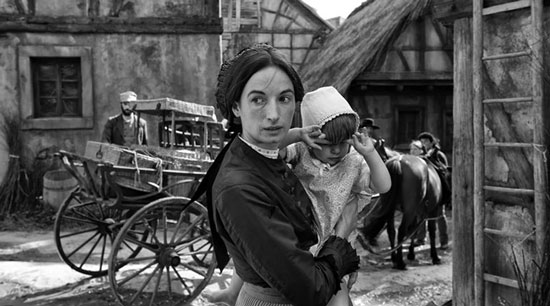
“Photographed magnificently in widescreen black and white by Gernot Roll, and designed with encyclopedic minuteness, initially by the late Toni Gerg, every image has the ring of authenticity – each hat, each wagon wheel, even each horse somehow looking quintessentially 1840s. But what’s consistently brilliant is the casting.” – The Guardian
Starring Antonia Bill, Jan Dieter Schneider, Marita Breuer, Maximilian Scheidt, Werner Herzog. In German with English subtitles. Recommended.
I Capture the Castle (2003): A critically-acclaimed romance set in 1930’s England, the period drama follows 17-year-old Cassandra Mortmain, and the fortunes of her eccentric family, struggling to survive in a decaying English castle. Salvation comes in the form of their American landlord Simon Cotton and his brother Neil.
Although initially repelled by Simon, Rose is determined to make him fall in love with her and succeeds. A wedding is arranged and Cassandra is left on the sidelines as everyone around her is drawn into a maelstrom of interconnected relationships. But events spiral out of control, and before the summer ends she will experience frustrated desire, first love, and a broken heart.
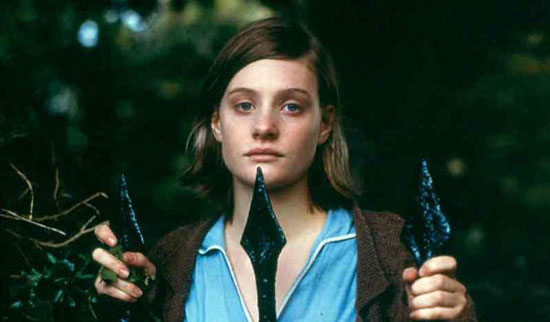
Starring Bill Nighy, Henry Cavil, Romola Cari, Rose Byrne. Rated R. Watch the TRAILER. A Willow and Thatch favorite.
Ida (2013): From acclaimed director Pawel Pawlikowski comes Ida, a moving and intimate drama about a young novitiate nun in 1960s Poland who, on the verge of taking her vows, makes a shocking discovery about her past.
18-year old Anna (stunning newcomer Agata Trzebuchowska), a sheltered orphan raised in a convent, is preparing to become a nun when the Mother Superior insists she first visit her sole living relative. Naive, innocent Anna soon finds herself in the presence of her aunt Wanda (Agata Kulesza), a worldly and cynical Communist Party insider, who shocks her with the declaration that her real name is Ida and her Jewish parents were murdered during the Nazi occupation. This revelation triggers a heart-wrenching journey into the countryside, to the family house and into the secrets of the repressed past, evoking the haunting legacy of the Holocaust and the realities of postwar Communism.
In this beautifully directed film, Pawlikowski returns to his native Poland for the first time in his career to confront some of the more contentious issues in the history of his birthplace. Powerfully written and eloquently shot, Ida a masterly evocation of a time, a dilemma, and a defining historical moment; Ida is also personal, intimate, and human. The weight of history is everywhere, but the scale falls within the scope of a young woman learning about the secrets of her own past. This intersection of the personal with momentous historic events makes for what is surely one of the most powerful and affecting films of the year.
Starring Agata Kulesza, Agata Trzebuchowska In Polish with English subtitles. Watch the TRAILER. Recommended.
In the Fog (2012): It is 1942 and the western edge of the USSR is under German occupation. In the region, local partisans are waging a brutal battle against their foreign enemies. Sushenya, an innocent rail worker, is arrested with a band of saboteurs when a train is derailed not far from his village. The German officer decides to set him free rather than hang him with the others, but rumors of Sushenya’s treason spread quickly and partisans Burov and Voitik seek revenge. Captured by the partisans, Sushenya is led through the forest where they are ambushed. Soon he finds himself one-on-one with his wounded enemy, forced to make a moral choice under immoral circumstances.
Starring Sergei Kolesov, Vlad Abashin, Vlad Ivanov, Vladimir Svirski. In Russian with English subtitles. Watch the TRAILER.
In the Mood for Love (2000): Hong Kong, 1962: Chow Mo-wan (Tony Leung Chiu-wai) and Su Li-zhen (Maggie Cheung Man-yuk) move into neighboring apartments on the same day. Their encounters are formal and polite–until a discovery about their spouses creates an intimate bond between them. At once delicately mannered and visually extravagant, Wong Kar-wai’s IN THE MOOD FOR LOVE is a masterful evocation of romantic longing and fleeting moments.
With its aching musical soundtrack and exquisitely abstract cinematography by Christopher Doyle and Mark Lee Ping-bin, this film has been a major stylistic influence on the past decade of cinema, and is a milestone in Wong’s redoubtable career.
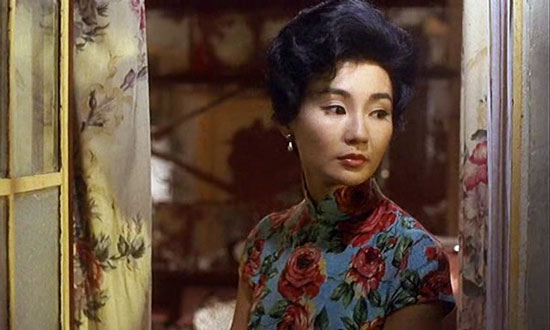
Starring Maggie Cheung, Ping Lam Siu, Tony Chiu Wai Leung. In Cantonese, Shanghainese with English subtitles. Rated PG. A Willow and Thatch favorite! Voted the 2nd best of the top 100 films by all the critics, this was also the highest rated film by the 55 female critics who participated in the BBC poll to find the 100 greatest motion pictures made since the year 2000. Read more here.
I, the Worst of All (1990): In order to pursue her love of writing, Juana enters the convent and gains international renown. When the Inquisition comes, the local Vicereine becomes Juana’s protectress and erotic muse, and soon begins a thrilling romance of startling passion and intensity. Set in 17th Century Mexico.
Sister Juana is a gentle poet and a none-too-pious nun, living in seventeenth-century Mexico. She is protected by the Governor and his wife from a ferociously misogynistic Archbishop, who some believe is using his hatred of women to hide from his very powerful lust for them. Indeed, it is possible that he is the actual father of Sister Juana. Regardless of that, her life becomes extremely grim when her loving patrons return to Spain, leaving her to the not-so-tender mercies of this harsh man. This difficult story is based on a novel by the award-winning poet and writer Octavio Paz.
“Luminously portrayed by Assumpta Serna as a free-spirited genius spilling over with self-confidence and good humor, Juana is the shining feminist heroine of Maria Luisa Bemberg’s film. With its many medium close-ups of clerics, nuns and aristocrats locked in debate, the film is a visually compelling portrait gallery of people caught in a war between rationalism and religious zealotry.” – New York Times
Starring Assumpta Serna, Dominique Sanda. In Spanish with English subtitles. Rated R. Recommended.
Jules and Jim (1962): In the carefree days before World War I, introverted Austrian author Jules (Oskar Werner) strikes up a friendship with the exuberant Frenchman Jim (Henri Serre). Both men fall for the impulsive and beautiful Catherine (Jeanne Moreau), but it’s Jules who wins her hand. After the war, Jim visits Jules, Catherine and their daughter in their Austrian home and discovers not only that his feelings for Catherine are unchanged, but also that they’re reciprocated.
Hailed as one of the finest films ever made, Jules and Jim charts, over twenty-five years, the relationship between two friends and the object of their mutual obsession. The legendary Francois Truffaut directs, and Jeanne Moreau stars as the alluring and willful Catherine, whose enigmatic smile and passionate nature lure Jules (Oskar Werner) and Jim (Henri Serre) into one of cinema’s most captivating romantic triangles. An exuberant and poignant meditation on freedom, loyalty, and the fortitude of love, Jules and Jim was a worldwide smash in 1962 and remains every bit as audacious and entrancing today.
Starring Henri Serre, Jeanne Moreau, Oskar Werner. In French with English subtitles. Recommended!
Kaos (1984): Magic, drama, misery, and hope are given life in five tales adapted from Luigi Pirandello’s Novelle per un anno. With a strong, poetic vision of Sicilian life, directors Paolo and Vittorio Taviani imbue this epic masterpiece with a serene, sympathetic revelation of mankind that transcends the boundaries of time. Set in the 19th century.
“Rigorous and eloquent, effortlessly poetic.” – New York Times
Starring Ciccio Ingrassia, Claudio Bigagli, Franco Franchi. In Italian with English subtitles. Rated R. Recommended!
Lacombe, Lucien (1974): In Louis Malle’s lauded drama, Lucien Lacombe (Pierre Blaise) is a young man living in rural France during World War II who seeks to join the French Resistance. When he is rejected due to his youth, the resentful Lucien allies himself with the Nazis and joins the Gallic arm of their Gestapo. Lucien grows to enjoy the power that comes with his position, but his life is complicated when he falls for France Horn (Aurore Clément), a beautiful young Jewish woman.
One of the first French films to address the issue of collaboration during the German occupation. At once the story of a nation and one troubled boy, the film is a disquieting portrait of lost innocence and guilt. Set in a small town in the south-west of France, summer of 1944.
Starring Aurore Clément, Holger Löwenadler, Pierre Blaise. In French with English subtitles. Rated R
La France (2007): A woman searches for her husband during World War I after he sends a letter ending the marriage. An intoxicating blend of wartime romance and brightly colored musical, the film depicts an original world “where Bresson meets the Beatles” (Variety).
“Here is one of the strangest and most original war movies I’ve seen.“ – Roger Ebert
Starring Sylvie Testud, Pascal Greggory. In English, French, with English subtitles.
Ladies in Lavender (2004): In this beautifully crafted British drama, aging spinster sisters Ursula (Dame Judi Dench – Skyfall, Philomena) and Janet (Dame Maggie Smith – Downton Abbey, Gosford Park) discover a young man (Daniel Bruhl – Inglourious Basterds, Captain America: Civil War) near death on the beach by their home in a small Cornish fishing village.
Taking him in, they discover that he is Andrea, a violinist from Krakow, Poland, who had been swept off an ocean liner on which he was sailing to a fresh start in America. Although Ursula feels an unfamiliar spark of infatuation for the handsome young musician, propriety suggests the attraction must remain unspoken. Nominated, British Actress of the Year – Judi Dench, London Critics Circle Film Awards
“…Perfectly sweet and civilized… It’s a pleasure to watch Smith and Dench together; their acting is so natural it could be breathing.” – Roger Ebert, Chicago Sun Times
Starring Daniel Bruhl, David Warner, Judi Dench, Maggie Smith, Toby Jones. Rated PG-13. A Willow and Thatch favorite!
Lady Chatterley (2006): In the Chatterley’s country estate, monotonous days follow one after the other for Constance, trapped by her marriage and her sense of duty. During spring, deep in the heart of Wragby forest, she encounters Parkin, the estate’s gamekeeper. The film is their story. The tale of an encounter, a difficult apprenticeship, a slow awakening to sensuality for her, a long return to life for him. Or how love is but one with experience and transformation.
Lady Chatterley in a new, two-part, Extended European Edition featuring nearly an hour of additional material excluded from the film’s theatrical cut that explores the emotional and sensual borderlands uniting sex, love, and loyalty with even more intelligence, passion, and power than before. Through extra footage never seen in the US, director Pascale Ferran’s “rapturous visual tone poem” (New York Times) becomes both a highly erotic immersion into Lady Chatterley and Parkin’s passion and an equally frank and unsentimentally provocative portrayal of a marriage hobbled by war and ultimately torn apart by hypocrisy.
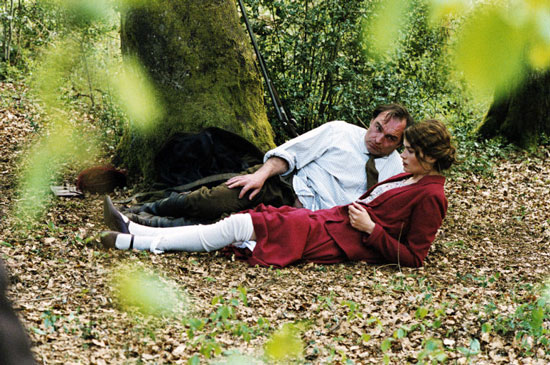
Starring Marina Hands, Jean-Louis Coulloc’h, Hippolyte Girardot. In French with English subtitles.
The Last Metro (1980): Members of a French theater company are living under the German occupation during World War II in Francois Truffaut’s gripping, humanist character study. Against all odds–a Jewish theater manager in hiding; a leading man who’s in the Resistance; increasingly restrictive Nazi oversight–the troupe believes the show must go on. Equal parts romance, historical tragedy, and even comedy, The Last Metro (Le dernier metro) is Truffaut’s ultimate tribute to art overcoming adversity.
Starring Catherine Deneuve, Gérard Depardieu, Jean Poiret. In French with English subtitles.
La Ronde (1950): Max Ophuls’s delightful, acerbic adaptation of Arthur Schnitzler’s controversial turn-of-the-century play Reigen. Soldiers, chambermaids, poets, prostitutes, aristocrats–all are on equal footing in this multicharacter merry-go-round of love and infidelity, directed with a sweeping gaiety as knowingly frivolous as it is enchanting, and shot with Ophuls’s trademark mellifluous cinematography.
Starring Anton Walbrook, Serge Reggiani, Simone Signoret. In French with English subtitles.
The Last Sentence (2011): Oscar-nominated director Jan Troell, one of Sweden’s most acclaimed filmmakers, directs the biopic The Last Sentence. Set against the backdrop of WWII, The Last Sentence is based on the life of crusading journalist Torgny Segerstedt, editor-in-chief of one of Sweden’s leading newspapers, highlighting his one-man battle against Nazism and his country’s policy of appeasement to Hitler.
With Sweden caught between Nazi Germany and Stalin’s Russia, the country’s elites chose a policy of neutrality and compliance, with few daring to speak up against the evil around them. Among those who did, nobody was as loud and as uncompromising as Segerstedt (Danish star Jesper Christensen), one of the most prominent Swedish journalists of the 20th century. In the eyes of many of his countrymen, his pen was far more dangerous than the Nazi sword. Amidst the political turmoil of the era, Segerstedt’s own personal life took a dramatic and scandalous turn as he entered into a very public affair with Maja Forssman, the Jewish wife of his close friend, the newspaper’s publisher. Maja Forssman is played by Pernilla August, winner of the Cannes Best Actress Award for Bille August’s Best Intentions.
Jan Troell is best known to US audiences for his critically acclaimed film Everlasting Moments (also starring Jesper Christensen), as well as The New Land and The Emigrants (1972), starring Max Von Sydow and Liv Ullman. Beautifully filmed in black-and-white, The Last Sentence is a gripping tale of a man who risked his life for his beliefs and refused to be silenced.
Starring Jesper Christensen, Pernilla August, Ulla Skoog, Björn Granath, Kenneth Milldoff, Lennart Hjulström, Peter Andersson, Birte Heribertson. In Swedish with English subtitles. Watch the TRAILER.
Life on the Mississippi (2011): Based on Mark Twain’s novel about his own experiences during the glorious days of riverboats. A veteran riverboat pilot takes on a young apprentice.
On the Mississippi River in the 1850’s, there could be no more romantic dream than to be a steamboat pilot. Braving the hazards of the deceptive, ever-changing river is precisely what Sam has dreamed of, and now, signing on as a “cub” with the pilot of the steamboat Paul Jones, Sam is getting his chance. His journey becomes the adventure of a lifetime, emotionally and physically tested by the river, his employer, and braving the disastrous effects of a deadly explosion.
Starring David Knell, Robert Lansing, James Keane, Donald Madden, John Pankow, Bill Holliday, Luke Reilly, Marcy Walker.
Little England (2014): On the Greek island of Andros, known as Little England, the Saltafero sisters fall in love with the same man, a secret that leads to a an epic web of treachery and deceit that spans two decades.
Set on the picturesque Greek island of Andros, Little England is the name of a pre-war shipping enterprise. The opening scene of crashing surf is a forbearance of the story’s turbulent and tragic events. 20 year-old Orsa is passionately in love with second mate Spyros, which she dares not reveal to anyone, least of all her domineering mother, Mina, herself the wife of a captain who prefers the seas over Andros. Without considering the girls desire to love, Mina conspires to wed them to the wealthiest suitors; Orsa to ship owner and captain Nikos Vatokouzis and Moscha to the very man Mina rejected as Orsa’s future husband, Spyros Maltabes, who returns a captain after years in the lower rankings of a ship’s hierarchy. A final tragedy seals the fate of the sisters as the story progresses into the throes of World War II.
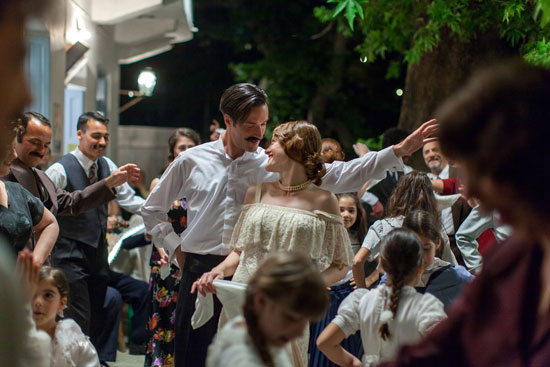
Starring Andreas Konstantinou, Anneza Papadopoulou, Penelope Tsilika, Sofia Kokkali. In Greek with English subtitles. Watch the TRAILER. Recommended!
Lola Montes (1955): A visually ravishing, narratively daring dramatization of the life of the notorious courtesan and showgirl, played by Martine Carol. With his customary cinematographic flourish and, for the first time, vibrant color, Max Ophuls charts the course of Montes’s scandalous past through the invocations of the bombastic ringmaster (Peter Ustinov) of the American circus where she has ended up performing. Ophuls’s final film, Lola Montesis at once a magnificent romantic melodrama, a meditation on the lurid fascination with celebrity, and a one-of-a-kind movie spectacle.
Starring Anton Walbrook, Martine Carol, Peter Ustinov. In French with English subtitles. Recommended!
Love And Anarchy (1973): An epic tragicomedy from director Lina Wertmuller (Seven Beauties), LOVE AND ANARCHY plumbs the depths of fascist Italy from the perspective of a simple farm boy sent to kill Mussolini.
Giancarlo Giannini won the best acting prize at the Cannes Film Festival for his achingly sensitive portrayal of Tunin, a freckle-faced innocent who became an accidental anarchist. His contact in Rome is Salome (Mariangela Melato), a prostitute with her own sob story. While they prepare for the assassination, Tunin falls in love with Tripolina (Lina Polito), which threatens the entire operation. A film of operatic emotion and subversive comedy, LOVE AND ANARCHY is a powerful statement on the terror of fascism and the ignoble fates of those who challenged it. Set in the 1930s.
Starring Giancarlo Giannini, Lina Polito, Mariangela Melato. In English, Italian, with English subtitles.
Lore (2012): Left to fend for themselves after their SS officer father and mother, staunch Nazi believers, are interred by the victorious Allies at the end of World War II, five German children undertake a harrowing journey that exposes them to the reality and consequences of their parents’ actions. Based on the book “Lore” by Rachel Seiffert.
Led by the eldest sibling, 14-year old Lore (striking newcomer Saskia Rosendahl), they set out on a journey across a devastated country to reach their grandmother in the north. After meeting the charismatic Thomas, a mysterious young refugee, Lore soon finds her world shattered by feelings of both hatred and desire as she must learn to trust the one person she has always been taught to hate in order to survive. Lush cinematography and an evocative, haunting mood infuse this unconventional take on the Holocaust legacy with unforgettable impact.
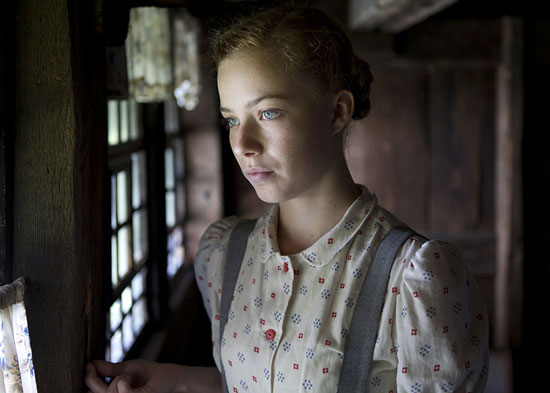
Starring Saskia Rosendahl, Nele Trebs, Mike Weidner, Ursina Lardi, Hans-Jochen Wagner, Nick Holaschke, André Frid, Mika Seidel. In German with English subtitles. Watch the TRAILER. Recommended.
The Lover / L’Amant (1992): Nominated for Best Cinematography at the Academy Awards and Best Foreign Film at the Cesar Awards THE LOVER is an acclaimed period romantic drama. In 1929 French Indochina, a French teenage girl embarks on a reckless and forbidden romance with a wealthy, older Chinese man, each knowing that knowledge of their affair will bring drastic consequences to each other.
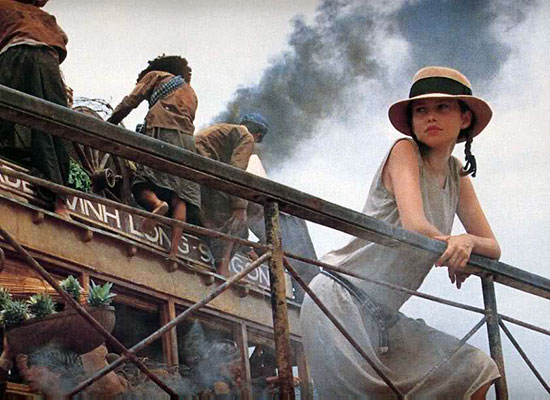
“Tough, clear-eyed & utterly unsentimental. Produced lavishly but with such discipline that the exotic locale never gets in the way of the minutely detailed drama at the center. It is so beautifully controlled that even the love scenes, though steamily photographed, have a kind of innocence about them. Like the girl, the film has a way of standing just a little outside everything it sees, considering, recording the details, reserving judgment.” – Vincent Canby, The New York Times
Starring Frédérique Meininger, Jane March, Tony Ka Fai Leung. Rated R. Note: You’ll either love this or you won’t like it. For mature audiences only, the period drama is based on the memoir of Marguerite Duras. The film shifts the girl’s age from 15 1/2 to 18. You should watch the TRAILER if you are on the fence. Beautifully shot, this is also a story about shifting power and colonialism. If you enjoyed Indochine, give it a try.
Maison Close (2010): Set in a lavish 19th Century Parisian bordello, the provocative and popular French erotic drama Maison Close invites American audiences into a sumptuous, stylized world where desire and power reign.
The story follows a cast of women trapped by circumstances beyond their control in the luxury brothel ‘Paradise’. Considered a first class “closed house” reserved for aristocratic or bourgeois clientele and noted for strange and refined practices during a time when prostitution was legalized, Paradise is populated by a fascinating cast of characters, each of whom struggles to find escape and solace in their own way. Hortense (Valerie Karsenti), is the manipulative and, in turn, manipulated mistress of the Paradise who runs her business with iron hand; Vera (Anne Charrier), the star of the bordello, is a beautiful courtesan in her thirties whose career is nearing its end; and, Rose (Jemima West), the heroine, is a country ingenue raised by nuns who goes to the Paradise searching for her mother, only to be blackmailed into becoming a prostitute. Unfolding like a serialized 19th century French naturalist novel, this uncompromising series is a mix of style and substance, a richly compelling period drama with unmistakably modern sensibilities.
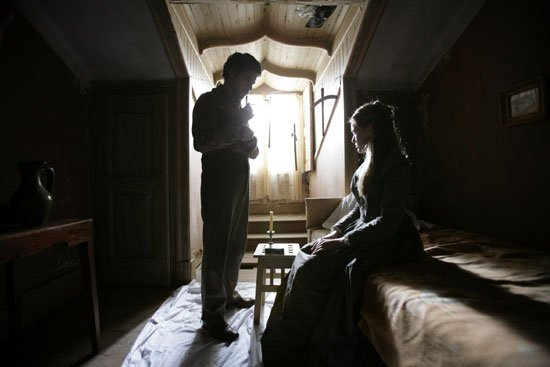
Set in Paris in 1871, right after the suppression of la Commune, a workers’ revolutionary movement that briefly took power. 2 seasons.
Starring Anne Charrier, Jemima West, Valérie Karsenti. In French with English subtitles.
The Man that Corrupted Hadleyburg (1980): Hadleyburg has a reputation for unshakable honesty. The smug towns-people are proud of this virtue and keep themselves honest by simply avoiding temptation. That is until The Man That Corrupted Hadleyburg arrives in town. Robert Preston stars as the stranger who plots a revenge on the hypocritical residents by promising a fortune to the citizens who once showed him charity many years before. One by one the stranger tempts the leading citizens to scheme for the money- until Hadleyburg’s honest reputation is mud before the world. Based on one of Mark Twain’s best-known short stories, The Man That Corrupted Hadleyburg is a cynical, yet humorous view of life in America’s small towns-a life that the acerbic Mr. Twain knew only too well.
Starring Fred Gwynne, Robert Preston, Fred Gwynne, Frances Sternhagen, Seth Allen, Kent Broadhurst.
The Man Who Will Come (2009): Winter 1943. Martina is small child, who stopped talking since the death of her infant brother some years before. She lives in a rural area of central Italy. Her mother is pregnant again and Martina lives for the arrival of her new brother. Meanwhile, the war is getting closer and closer, forcing the people of the village to tread a difficult path, torn between the partisan brigades and the Nazi Army.
On practically the same day as the birth of Martina’s brother, the SS start a massive roundup of civilians in the area, an infamous event that will come to be known as the Marzabotto massacre during which more than 770 people were killed in houses, cemeteries and churches.
Starring Alba Rohrwacher, Eleonora Mazzoni, Maya Sansa. In Italian with English subtitles.
Marie’s Story (2014): At the turn of the 19th century, a humble artisan and his wife have a daughter, Marie, who is born deaf and blind and unable to communicate with the world around her. Desperate to find a connection to their daughter and avoid sending her to an asylum, the Heurtins send fourteen-year-old Marie to the Larnay Institute in central France, where an order of Catholic nuns manage a school for deaf girls.
There, the idealistic Sister Marguerite sees in Marie a unique potential, and despite her Mother Superior’s skepticism, vows to bring the wild young thing out of the darkness into which she was born. Based on true events, Marie’s Story recounts the courageous journey of a young nun and the lives she would change forever, confronting failures and discouragement with joyous faith and love.
Starring Ariana Rivoire, Isabelle Carré, Brigitte Catillon. In French with English subtitles. Recommended.
Marius & Fanny (2013): Marius is the first part of Marcel Pagnol’s classic trilogy following the loves and losses of a Marseille port community. Actor and director Daniel Auteuil (The Well-Digger’s Daughter) has made a sumptuous adaptation that will make you swoon. Marius (Raphael Personnaz) is the strapping young son of Cesar (Auteuil), a blustery cafe owner.
Marius has known and adored the pretty fishmonger Fanny (Victoire Belezy) since they were children, but he is torn between his love for her and his love for the sea. Fanny, meanwhile, is being courted by the kindly old shop-owner Panisse (Jean- Pierre Darroussin), who offers wealth and stability. Marius and Fanny are torn between freedom and responsibility, and every decision they make leads to greater heartbreak.
Fanny is the second part of Marcel Pagnol’s classic trilogy following the loves and losses of a Marseille port community. Actor and director Daniel Auteuil has faithfully and beautifully recreated the grand emotions of this beloved text. Following the events in the first part, Marius, Fanny (Victoire Belezy) is abandoned and pregnant, and fearful for the future of her unborn child. To secure the baby’s future, she agrees to marry the wealthy merchant Panisse (Jean-Pierre Daroussin), who guarantees a comfortable, if loveless, future. As she is adjusting to her new reality, Marius re-appears in her life like a phantom, and all the old, powerful emotions bubble up once again. Fanny is a supremely entertaining melodrama that won’t leave a dry eye in the house.
Starring Daniel Auteuil, Jean-Pierre Darroussin, Victoire Bélézy, Orane Demazis, Pierre Fresnay, Raimu. In French with English subtitles. Watch the TRAILER for Marius. Watch the TRAILER for Fanny.
The Marquise of O (1976): Eric Rohmer’s classic film is set in 1799 during the Russian invasion of Italy. A young widow, The Marquise (Edith Clever) lives with her parents in the fort her father commands. In the midst of battle, the Marquise is abducted by a group of rowdy soldiers and nearly taken advantage of when the Russian commander Count F (Bruno Ganz) rescues her.
Later, the Marquise realizes she is pregnant, though she cannot decipher how the circumstance came to be. The Marquise pens a letter to the newspaper announcing that she will marry the father, whomever he may be, should he only present himself. Winner, Special Jury Prize, Cannes Film Festival.
Starring Bruno Ganz, Edda Seippel, Edith Clever, Peter Luhr. In English, German, with English subtitles. Watch the TRAILER.
The Marriage of Maria Braun (1978): Maria (Hanna Schygulla) marries Hermann Braun in the last days of World War II, only to have him disappear in the war. Alone, Maria uses her beauty and ambition to prosper in Germany’s “economic miracle” of the 1950’s. Fassbinder’s biggest international box-office success and the first part of his “postwar trilogy,” The Marriage of Maria Braun is a heartbreaking study of a woman picking herself up from the ruins of her own life, as well as a pointed metaphorical attack on a society determined to forget its past.
Starring Hanna Schygulla, Ivan Desny, Klaus Löwitsch. In German with English subtitles.
Men Go to Battle (2015): Most Americans predict that the Civil War will end by Christmas, but Henry and Francis Mellon couldn’t care less. Bracing for another winter on their struggling farm in rural Kentucky, the brothers have become suffocatingly close. Francis’ practical jokes become more and more aggressive until the night he accidentally injures Henry in a drunken fight. After humiliating himself in front of a daughter of the town’s preeminent family, Henry disappears in the night. Months later, Francis learns that Henry has joined the Union army, and the two are left to find out separately what the approaching war will bring.
Starring David Maloney, Rachel Korine, Steve Coulter, Tim Morton. Watch the TRAILER.
Miss Julie (1951): Swedish filmmaker Alf Sjoberg’s visually innovative, Cannes Grand Prix-winning adaptation of August Strindberg’s renowned 1888 play brings to scalding life the excoriating words of the stage’s preeminent surveyor of all things rotten in the state of male-female relations. Miss Julie vividly depicts the battle of the sexes and classes that ensues when a wealthy businessman’s daughter (Anita Bjork, in a fiercely emotional performance) falls for her father’s bitter servant.
Celebrated for its unique cinematic style (and censored upon its first release in the United States for its adult content), Sjoberg’s film was an important turning point in Scandinavian cinema.
Starring Anita Björk, Märta Dorff, Ulf Palme. In Swedish with English subtitles. Recommended.
Mister Johnson (1990): In 1920s Africa, young black accountant Mister Johnson (Maynard Eziashi) is talented enough to get an accounting job at the English colonial offices, but he quickly learns that his race prevents him from advancing to the respectable kind of position he desires. Hoping to impress his superior, Harry Rudbeck (Pierce Brosnan), he decides to fudge some numbers and save his boss thousands. When his plan backfires, however, Johnson desperately turns to even more illegal measures in order to succeed.
A decade after he broke through with Breaker Morant, Australian director Bruce Beresford made another acclaimed film about the effects of colonialism on the individual. In a performance that earned him the Berlin Film Festival’s Silver Bear for best actor, Maynard Eziashi plays the title character, a Nigerian villager eager to work as a civil servant for the British authorities, including a sympathetic district officer, in the hope that it will benefit him in the future. Instead, his ambition leads to his tragic downfall. Based on the 1939 novel by Joyce Cary, the period movie is a graceful, heartfelt drama about the limits of idealism, affectingly acted and handsomely shot.
Starring Edward Woodward, Maynard Eziashi, Pierce Brosnan. Recommended.
Mother of Mine (2005): During World War II, more than 70,000 Finnish children were evacuated to neutral Sweden to avoid the conflict. Mother of Mine, directed by the award-winning Klaus Haro (Elina), tackles that painful patch of history in a tale of 9-year-old Eero, a child who increasingly feels abandoned by his biological Finnish mother fighting for her life and yet not attached to his Swedish surrogate mom desperately trying to save him from the Nazis. When Eero is returned to Finland, his confusion intensifies. Winner – Audience Award – Palm Springs Int’l Film Festival. Official Selection – Toronto Int’l Film Festival
Starring Maria Lundqvist, Marjaana Maijala, Michael Nyqvist, Topi Majaniemi. In Finnish, Swedish, with English subtitles. Recommended.
Mozart’s Sister (2010): A re-imagined account of the early life of Maria Anna ‘Nannerl’ Mozart, five years older than Wolfgang and a musical prodigy in her own right.
Once the featured performer, Nannerl has given way to Wolfgang as the main attraction, as their strict but loving father Leopold tours his talented offspring in front of the royal courts of pre-French Revolution Europe. Approaching marriageable age and now forbidden to play the violin or compose, Nannerl chafes at the limitations imposed on her gender. But a friendship with the son and daughter of Louis XV offers her ways to challenge the established sexual and social order.
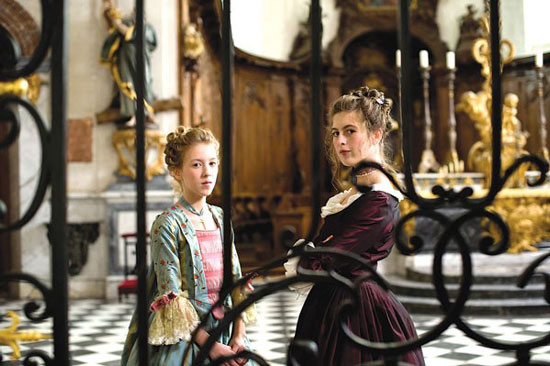
Starring Delphine Chuillot, Marc Barbé, Marie Féret. In French with English subtitles. Watch the TRAILER. A Willow and Thatch favorite!
Murmur of the Heart – Le souffle au coeur (1971): Louis Malle’s critically acclaimed Murmur of the Heart gracefully combines elements of comedy, drama, and autobiography in a candid portrait of a precocious adolescent boy’s sexual maturation. Both shocking and deeply poignant, this is one of the finest coming-of-age films ever made. Set in the 1950s.
Starring Benoît Ferreux, Daniel Gélin, Lea Massari. In French with English subtitles. Recommended!
My Brilliant Career (1979): Sometimes it is the things that bind us, that truly set us free. A story charting the developing self-awareness of Sybylla Melvyn as she grows from an insecure tomboy to a self-assured woman. Sybylla wants to be a writer and stuns her family and friends by her insistence on following her dream. Despite the objections of her family acquaintances, she rejects the marriage proposal from the rich Harry Beecham to continue going her own way, in spite of the odds stacked against her in a repressive Victorian environment.
Sybylla Melbyn (Judy Davis) is the eldest daughter of an impoverished New South Wales farming family. Bold and determined, Sybylla dreams of succeeding as an acclaimed writer. But in a time of sexist ignorance and bigotry Sybylla has frequent clashes with procrustean conformists. Though it is her love for the dashing Harry Beacham (Sam Neill) that will truly test her desire to succeed as a writer. As events twist and turn, Sybylla is painfully forced to realise the emotional cost of putting her career over love. Set in late 19th century Australia.
Critically acclaimed, winning six AFI Awards, as well as being nominated for an Academy Award, Golden Palm award at the Cannes Film Festival, and Golden Globe Award, My Brilliant Career is a delicate parable of one woman’s fight for independence, and the sacrifices of the heart that must be made along the way.
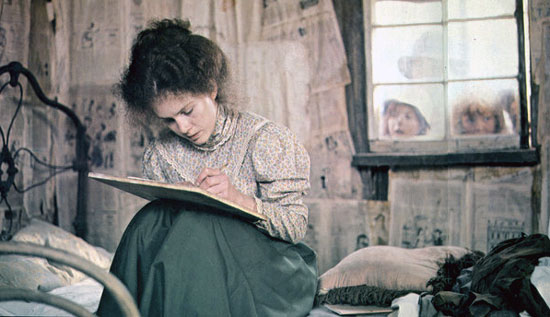
Starring Judy Davis, Patricia Kennedy, Robert Grubb, Sam Neill, Wendy Hughes. Rated G. A Willow and Thatch favorite!
My Life as a Dog (1985): In 1959 Sweden, young Ingemar (Anton Glanzelius) lives with his dying mother and his nasty older brother. He survives all of life’s knocks by comparing himself to those who are worse off–such as Laika, the little Russian space dog who was rocketed to his death and had nothing to say in the matter. Ingemar begins to identify with Laika more and more as his mother’s health deteriorates, at times dropping to all fours and baying at the moon. When his mother is advised to get some peace and quiet away from her children, Ingemar is sent to live with his loveable uncle and aunt. For the first time, the boy is surrounded by relatives and classmates who pose no threat and who genuinely like him. He even has a sexual awakening. When his mother dies, he no longer rationalizes his misfortunes by comparing himself to those less fortunate; from now on, he can conjure up pleasant memories of his summer away from home to sustain him through the hard times. My Life as a Dog (Mitt Liv Som Hund) is based on the autobiographical novel by Reidar Jonsson.
Featuring an incredibly mature and unaffected performance by the young Anton Glanzelius, this film is a beloved and bittersweet evocation of the struggles and joys of childhood from Oscar-nominated director Lasse Hallstrom.
Starring Anki Lidén, Anton Glanzelius, Tomas von Brömssen. In Swedish with English subtitles. Rated PG-13. A Willow and Thatch favorite!
Mysteries of Lisbon (2010): Mysteries of Lisbon plunges us into a whirlwind of adventures and escapades, sentiments and violent passions, all wrapped in a rhapsodic voyage that takes us from Portugal, France, Italy, and as far as Brazil. In this Lisbon of intrigue and hidden identities, we encounter a series of characters all linked to the destiny of Pedro da Silva, an orphan in a boarding school.
A masterful adaptation of the eponymous nineteenth-century Portuguese novel (by Camilo Castelo Branco) evokes the complex intertwined narratives of Victor Hugo and Charles Dickens. The core story centers on Joao, the bastard child of an ill-fated romance between two members of the aristocracy who are forbidden to marry, and his quest to discover the truth of his parentage. But this is just the start of an engrossing tale that follows a multitude of characters whose fates conjoin, separate and then rejoin again over three decades in Portugal, Spain, France and Italy.
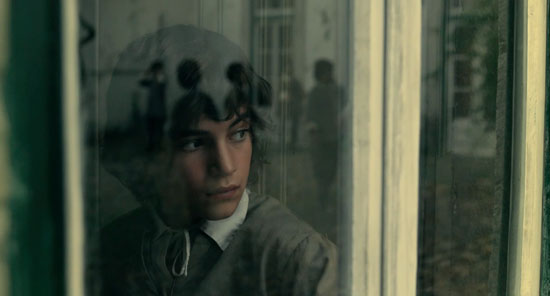
“Hypnotically beautiful, playful, coiling between past and present. The film painstakingly re-creates the world of nobility in Portugal, France, Spain and Italy. It immersed me, it wove a spell…” – Roger Ebert
The 2-part movie is a notably long 272 minutes. The film has won 9 awards and has been nominated 8 times.
Starring Adriano Luz, Afonso Pimentel, Clotilde Hesme, Maria João Bastos, Ricardo Pereira. In French, Portuguese, with English subtitles. Watch the TRAILER. Recommended.
Newsfront (1978): Directed by Phillip Noyce and produced by David Elfick, Newsfront represents a seminal moment in the emergence of the Australian movie industry on the world stage. Set between 1949 and 1956, Newsfront tracks the destinies of two brothers, their adventures and misadventures placed in the context of sweeping social and political changes in their native Australia. Both of the protagonists are newsreel photographers: Frank is constitutionally resistant to change, while Len welcomes any alterations in his own life and in the world around him.
Highly acclaimed at the 1978 Cannes Film Festival and the winner of 18 international awards including 8 AFI Awards, Newsfront garnered raves from critics around the world and became a major box office success at home. Featuring one of the finest Australian casts ever assembled, many of whom were soon to become household names.
Starring Bill Hunter, Bryan Brown, Gerard Kennedy, Wendy Hughes. Rated PG. Recommended.
No God, No Master (2014): When a series of package bombs show up on the doorsteps of prominent politicians and businessmen in the summer of 1919, U.S. Bureau of Investigation Agent William Flynn is assigned the task of finding those responsible. He becomes immersed in an investigation that uncovers an anarchist plot to destroy democracy. Inspired by true events of the 20’s the film sets the stage for a timely thriller with resoundingly similar parallels to the contemporary war on terrorism and the role government plays to defeat it.
Starring David Strathairn, Ray Wise, Sam Witwer. Rated PG-13
North Face (2008): Based on a true story, North Face is a suspenseful adventure film about a competition to climb the most dangerous rock face in the Alps. Set in 1936, as Nazi propaganda urges the nation’s Alpinists to conquer the unclimbed north face of the Swiss massif – the Eiger – two reluctant German climbers begin their daring ascent.
“4 Stars! One of the best mountain climbing movies ever made” – Seattle Times
“Critic’s Pick! A transfixing life-and-death adventure tale.” – The New York Times
Starring Benno Fürmann, Johanna Wokalek, Ulrich Tukur. In German with English subtitles. Watch the TRAILER.
The Other Side of the Mountain (2012): During the Korean War, a young nurse in the small town of Chunamri, North Korea, saves a wounded South Korean soldier who has been left behind during battle. Brought together by the unfortunate circumstance of war, theirs is a fateful meeting.
His identity is unknown to her until he must return to South Korea. Separated by war and countries between them, the young man tries everything to get back to the North but diplomatic relations between countries make it impossible for their reunion. As the years go by and their youth slips away from them, he finally gets an unexpected opportunity to fulfill his wish and return to her. But reunions are not easy. Set in the early 1950s.
Starring Hyang Suk Kim, Ryung Min Kim, Jung Taik Park. In Korean with English subtitles. Watch the TRAILER.
On Guard – Le bossu (1997): The swordplay never ends in this dazzling, Dumas-like adventure of conspiracy and revenge, set around 1700 and presented here in its seventh filmed incarnation, directed by French New Wave titan Philippe de Broca.
Daniel Auteuil plays Legardere, a callow swordsman who becomes friend to and bodyguard of the Duke of Nevers (Vincent Perez). When the latter is assassinated by his scheming cousin, Gonzague (Fabrice Luchini), Nevers’s daughter, Aurore (Marie Gillain), is left in the care of Legardere, who raises her within the protective camouflage of a traveling troupe of actors. Years later, back in Paris, Legardere exacts a complicated retribution under Gonzague’s nose, determined to give Aurore the life and inheritance she deserves.
Nominated for 8 Cesar Awards, including Best Actor (Daniel Auteuil), Best Actress (Marie Gillain) and Best Film. Nominated for Best Film not in the English Language at the BAFTA Awards
“A big, gorgeous, sprawling swashbuckler that delivers its diversions in grand, uncomplicated fashion.” – San Francisco Chronicle
Starring Daniel Auteuil, Marie Gillain, Philippe Noiret, Vincent Perez. In French with English subtitles. Watch the TRAILER.
Paul’s Case (1980): Lost in a world of fantasy, young working-class Paul dreams of escaping his dreary existence in turn-of-the-century Pittsburgh. As fate would have it Paul gets his chance by stealing some money and subsequently running off to glamorous New York City. Once there, Paul experiences everything he ever dreamed of…from a luxurious hotel suite to his first taste of champagne. However, when reality finally comes crashing down around him, Paul realizes the desperate course he must now take. In a powerful and intense performance, Eric Roberts plays the title role in author Willa Cather’s Paul’s case. As the tortured and tragic young man, Roberts brings to life this classic American story of a sensitive soul pitted against an uncaring materialistic society.
Starring Eric Roberts, Michael Higgins.
Pelle the Conqueror (1987): Lasse, an elderly and widowed farmer, and his young son Pelle, join a boat-load of immigrants to escape from impoverished rural Sweden to Denmark’s Baltic island of Bornholm. They are employed at a large farm in Denmark, where they are treated as the lowest of the low. It is ultimately their loving relationship which sustains them through a difficult year. Set in the late 1850s, and based upon the famous 1910 novel of the same name by Danish writer Martin Andersen Nexø.
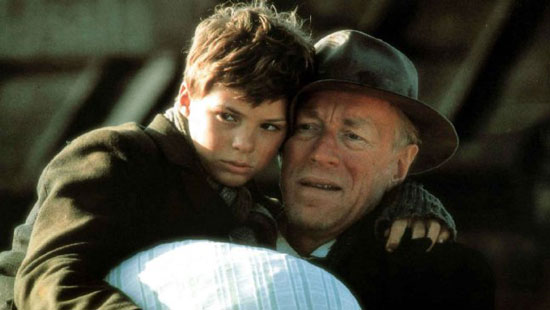
“Von Sydow’s work in the film has been honored with an Academy Award nomination for best actor, well deserved, particularly after a distinguished career in which he stood at the center of many of Ingmar Bergman’s greatest films (“The Virgin Spring,” “The Seventh Seal”). But there is not a bad performance in the movie, and the newcomer, Pelle Hvenegaard, never steps wrong in the title role (there is poetic justice in the fact that he actually was named after the novel that inspired this movie). It is Pelle, not Lasse, who is really at the center of the movie, which begins when he follows his father’s dream, and ends as he realizes he must follow his own.” – Roger Ebert
Starring Christian Bruno, Max von Sydow, Pelle Hvenegaard. In Danish, Swedish, with English subtitles. Rated PG-13. Watch the TRAILER. Recommended.
Puddin’ Head Wilson (1984): America’s magnificent storyteller, Mark Twain, has crafted an intriguing and classic tale of mistaken identity, deceit and murder. Here a slave woman cradle-switches her master’s son with her own light-skinned baby, however, even though raised as a white man, he never fulfills her hopes and dreams for him as he becomes an arrogant and cruel man. Acclaimed actor Ken Howard stars as the local lawyer unraveling the mystery.
Starring Ken Howard, Steven Webber.
The Queen of Spain – La reina de España (2016): Oscar-winner Penelope Cruz stars as the famous movie star Macarena Granada, who flees the glitz and glamour of 1950s Hollywood to return to her roots in Spain where she has signed on to star in an epic film as Queen Isabella of Spain. Nominated for Best Lead Actress (Penelope Cruz) and Best Cinematography at the Goya Awards.
“This bittersweet political satire uncovers the shameful collusion of Hollywood with Franco back then – the roots of fascism in this country today. And [situates] Penelope as a new kind of anti-fascist female action hero — move over ‘Wonder Woman’ and ‘Atomic Blonde!'” – Prairie Miller, WBAI Radio
“A sharp and precise critique of the Franco dictatorship in Spain.” – Erick Estrada, Cinegarage
Starring Cary Elwes, Mandy Patinkin, Penelope Cruz. In Spanish and English with English subtitles. Watch the TRAILER.
Queen Margot – La reine Margot (1994): She is beautiful. She is Catholic. She is the King’s sister. She is Marguerite de Valois. Her brothers call her Margot. He is Protestant. They say that he is rude, that he never shaves, that he smells of garlic and sweat. He is Henri de Navarre. They are forced to marry in a political move to reconcile France, ripped apart by the Wars of Religion.
Triumphant winner of 5 Cesar Awards and the prestigious Cannes Film Festival Jury Prize.
Starring Daniel Auteuil, Isabelle Adjani, Vincent Perez. In French with English subtitles. Rated R. Watch the TRAILER. Recommended.
Rappaccini’s Daughter (1980): Set in 18th Century Italy, RAPPACCINI’S DAUGHTER is the tale of a young scholar named Giovanni who falls in love with a beautiful, yet forbidden, girl who tends her father’s poison garden. However, the strange and unearthly beauty of Beatrice masks a terrifying curse which Giovanni must tragically discover. Her father, the mysterious Dr. Rappaccini, has made her the subject of a diabolical experiment. In Giovanni’s attempt to free Beatrice from the control of her father and to escape the poisonous effect she begins to have on him, he unwittingly destroys her. From the short story of master American novelist Nathaniel Hawthorne, two quintessential Hawthorne themes are explored: the sins of interfering with another’s soul and the futility of trying to tamper with nature.
Starring Kathleen Beller, Kristoffer Tabori, Michael Egan.
Rashomon (1950): This landmark Japanese masterpiece is Akira Kurosawa’s cinematic examination of the subjective nature of truth. In feudal Japan, three men sheltering from a storm discuss an incident where a bandit raped a woman whose husband then somehow died. The film’s innovative narrative structure recounts that incident from four differing viewpoints.
A riveting psychological thriller that investigates the nature of truth and the meaning of justice, Rashomon is widely considered one of the greatest films ever made. Four people give different accounts of a man’s murder and the rape of his wife, which director Akira Kurosawa presents with striking imagery and an ingenious use of flashbacks. This eloquent masterwork and international sensation revolutionized film language and introduced Japanese cinema—and a commanding new star by the name of Toshiro Mifune—to the Western world.
“(The film) struck the world of film like a thunderbolt. Directed by Kurosawa in the early years of his career, before he was hailed as a grandmaster, it was made reluctantly by a minor Japanese studio, and the studio head so disliked it that he removed his name from the credits. Then it won the Golden Lion at the Venice Film Festival, effectively opening the world of Japanese cinema to the West. It won the Academy Award as best foreign film. It set box office records for a subtitled film. Its very title has entered the English language, because, like “Catch-22,” it expresses something for which there is no better substitute.” – Roger Ebert
Starring Machiko Kyo, Masayuki Mori, Toshirô Mifune. In Japanese with English subtitles. Watch the TRAILER. Recommended!
The Red and the Black (1997): A young teacher in the Napoleonic era falls in love with an older woman.
Handsome and ambitious, Julien Sorel (Kim Rossi Stuart) is determined to rise above his humble peasant origins and make something of his life by adopting the code of hypocrisy by which his society operates. Driven by passion, principle or insanity, Julien ultimately commits a crime that brings about his downfall. The Red and the Black also stars Carole Bouquet in an epic, satirical picture of the French Restoration and a society that is riddled with corruption and greed.
Starring Carole Bouquet, Kim Rossi Stuart, Judith Godrèche, Claude Rich, Bernard Verley. In French, English with English subtitles.
Red Beard (1965): A testament to the goodness of humankind, Akira Kurosawa’s Red Beard (Akahige) chronicles the tumultuous relationship between an arrogant young doctor and a compassionate clinic director. Toshiro Mifune, in his last role for Kurosawa, gives a powerhouse performance as the dignified yet empathic director who guides his pupil to maturity, teaching the embittered intern to appreciate the lives of his destitute patients. Perfectly capturing the look and feel of 19th-century Japan, Kurosawa weaves a fascinating tapestry of time, place, and emotion.
Starring Toshirô Mifune, Tsutomu Yamazaki, Yuzo Kayama. In Japanese with English subtitles.
Remembrance – Die verlorene Zeit (2010): Inspired by actual events, Remembrance depicts a remarkable love story that blossomed amidst the terror of a German concentration camp in Poland 1944. In a daring escape Tomasz, a young Polish political prisoner, rescues his Jewish fiancee Hannah, whom he meets while imprisoned. With the Nazis in pursuit and determined to deter future escapees, Hannah and Tomasz survive the initial chase and overcome all odds to make their way into hiding. Chaos ensues after Tomasz decides to rejoin the Polish resistance and find his brother. His role in the Resistance offer clues as to why Tomasz was imprisoned. He had promised to return for his fiancee, but Hannah is forced to flee once again before Tomasz is able to come back for her. They are torn apart and each becomes convinced that the other is lost.
Starring Alice Dwyer, Dagmar Manzel, David Rasche, Mateusz Damiecki, Shanel Van Santen. In English, German, Polish, with English subtitles.
Renoir (2012): Set on the French Riviera in the summer of 1915, Jean Renoir — son of the Impressionist painter, Pierre-Auguste — returns home to convalesce after being wounded in World War I. At his side is Andree, a young woman who rejuvenates, enchants, and inspires both father and son. This historical drama screened at the Cannes Film Festival and was nominated for eight Cesar Awards and Lumiere Awards.
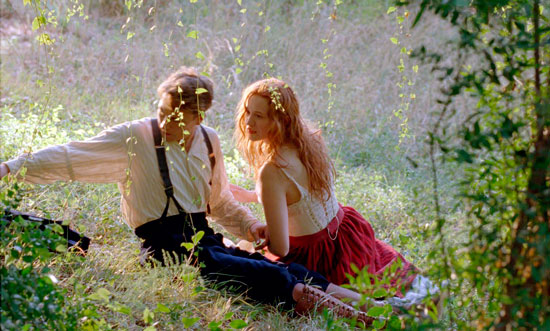
Starring Christa Theret, Michel Bouquet, Vincent Rottiers. In French, Italian, with English subtitles. Watch the TRAILER. Recommended!
The Retrieval (2014): 1864: as war ravages the nation, on the outskirts of the civil War, it is business as usual for slave-owners and traders. The Retrieval follows Will (Ashton Sanders), a fatherless thirteen-year-old boy who survives by working with a white bounty hunter gang. They send him to earn the trust of runaway slaves in order to lure them back to the south.
On a dangerous mission into the free north to find Nate (Tishuan Scott), a fugitive freedman, things go wrong and Will and Nate find themselves on the run. As the bond between them unexpectedly grows, Will becomes consumed by conflicting emotions as he faces a gut-wrenching final decision. Thrilling, but grounded in historical research, The Retrieval serves as an insight into the grey period between slavery and freedom and the horrific moral dilemma that comes with being forced to betray your fellow man.
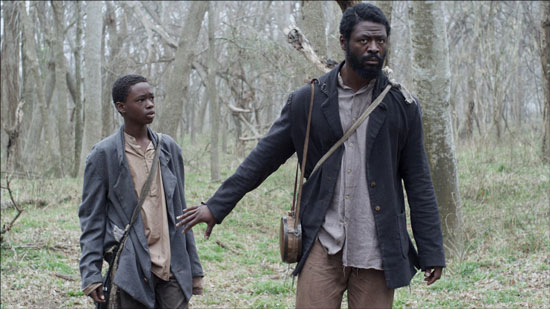
Starring Ashton Sanders, Tishuan Scott, Keston John. Watch the TRAILER. Recommended!
The River Kings (1991): In the great Australian tradition of All The Rivers Run, based on Max Fatchen’s novels The River Kings and Conquest of the River, this four-part miniseries captures the perilous life along South Australia’s Murray River and the many adventures aboard the paddleboat steamer Lazy Jane during the 1920s.
With his father absent and life on the land an interminable struggle, sixteen year-old Shawn Hofner (Tamblyn Lord) is forced to leave behind farm life and find work to support his family. The one sure thing that offers up hope is the Murray River and Shawn takes up a job as a deck-hand on a reliable steamboat run by well-seasoned Captain Elijah (Bill Kerr, Gallipoli).
It is a tough existence for a naive boy on the rapid flowing river, with danger and discovery around every bend. During Shawn’s many trips up and down the river he is destined to experience first-hand the tough and unforgiving temperament of nature, navigating life’s great adventure and the many tragedies and triumphs that come floating his way.
Starring Reg Evans, Tamblyn Lord, Bill Kerr, Willie Fennell, Kate Mulcahy. Rated PG. Recommended!
Secrets of War – Oorlogsgeheimen (2014): Tuur and Lambert are best friends in a Nazi-occupied Dutch village who pass their days playing soldiers and exploring local caves, mimicking a war that seems far removed from their everyday life. When Maartje joins their class, the young girl immediately stands out as different from her classmates. Yet the boys embrace their new friend, forming a unique bond based on shared adventures, secrets and mischief.
Ultimately, the realities of war find even them – Lambert’s father, a Nazi sympathizer, is named mayor of their town and Tuur discovers his own father and brother have joined the resistance, instantly putting the two boys at odds. Meanwhile, Maartje is hiding a secret of her own, one that not only threatens to tear the new friends apart, but could lead to devastating consequences for anyone involved in keeping it. Secrets Of War puts both the danger and the humanity of wartime friendships squarely on the shoulders of three children who must face extraordinary circumstances with a maturity far beyond their years.
Starring Joes Brauers, Maas Bronkhuyzen, Pippa Allen. In Dutch with English subtitles. Watch the TRAILER. Recommended! May be suitable for family viewing.
Seraphine (2008): The true story of Seraphine Louis aka Seraphine de Senlis (Yolande Moreau), a simple and profoundly devout housekeeper who in 1905 at age 41 — self-taught and with the instigation of her guardian angel — began painting brilliantly colorful canvases.
In 1912 Wilhelm Uhde (Ulrich Tukur), a German art critic and collector, discovered her paintings while she worked for him as a maid in his lodgings in Senlis outside Paris. Director Martin Provost builds his story around the relationship between the avant-garde art dealer and the visionary cleaning lady, forging a testament to the mysteries of creativity and the resilience of one woman’s spirit.
Starring Anne Bennent, Ulrich Tukur, Yolande Moreau. In French with English subtitles. Watch the TRAILER. Award-winning and recommended.
Siberian Lady Macbeth (1962): In what might be termed Russo-Shakespearean noir, a ruthless woman’s adulterous affair with a drifter sets in motion a chain-reaction of murder and deception in a remote village in 19th Century Mtsensk.
Starring Olivera Markovic, Ljuba Tadic, Kapitalina Eric, Bojan Stupica, Miodrag Lazarevic, Branka Petric, Ingrid Lotarius. In English, Serbo-croatian, with English subtitles.
The Sky is Gray (1980): From Ernest J. Gaines, author of “The Autobiography of Miss Jane Pittman”, comes a deceptively simple, yet emotionally complex tale of a young boy’s discovery of what it’s like to be black in Louisiana during the 1940’s. James, the boy in question, has a raging toothache that necessitates a trip to the dentist. His mother accompanies James to town on an eye opening odyssey where the boy gains valuable insights into poverty, racism-and his own sense of pride. With an exciting musical score by Webster Lewis, this multi-award winning film explores a child’s discovery that the world is a complicated place…where things are never truly black or white…only shades of gray.
Starring Henry Fonda, James Bond III, Olivia Cole, Margaret Avery, Cleavon Little, Chez Lister, Susan French, Clinton Derricks-Carroll, Hal Williams.
Sophie and the Rising Sun (2017): Set in the autumn of 1941 in Salty Creek, a fishing village in South Carolina, this film tells the dramatic story of interracial lovers swept up in the tides of history.
As World War II rages in Europe, a wounded Asian stranger, Mr. Ohta, appears in the town under mysterious circumstances. Sophie, a native of Salty Creek, quickly becomes transfixed by Mr. Ohta and a friendship born of their mutual love of art blossoms into a delicate and forbidden courtship. As their secret relationship evolves, the war escalates tragically.
When Pearl Harbor is bombed, a surge of misguided patriotism, bigotry and violence sweeps through the town, threatening Mr. Ohta’s life. A trio of women each with her own secrets — Sophie, along with the town matriarch, and her housekeeper — rejects law and propriety, risking their lives with their actions. Official Selection at the Sundance Film Festival.
“Warm, heartfelt… this lovely, evocative movie was written and directed by the talented Maggie Greenwald. The actors are superb. The nuanced writing and direction have insight. The three-dimensional portrayals of women in the rural south during the war are praiseworthy.” – Rex Reed, The New York Observer
Starring Diane Ladd, Julianne Nicholson, Lorraine Toussaint, Margo Martindale, Takashi Yamaguchi. Watch the TRAILER. Recommended.
The Scent of Green Papaya (1993): An Academy Award nominee for Best Foreign Language Film and winner of the Camera D’Or at the Cannes Films Festival, THE SCENT OF GREEN PAPAYA is set in 1951 Saigon, where 10 year old Mui enters household service for an affluent but troubled Vietnamese family.
Tran Anh Hung’s “luxuriant, visually seductive debut” (New York Times) recreates antebellum Vietnam through both the wide eyes of childhood and the deep blush of first love. Despite her servile role, Mui discovers beauty and epiphany in the lush physical details that envelope her, while earning the fragile affection of the household’s grieving matriarch. As she comes of age, the now grown Mui finds her relationship with a handsome pianist she has admired since childhood growing in depth and complexity.
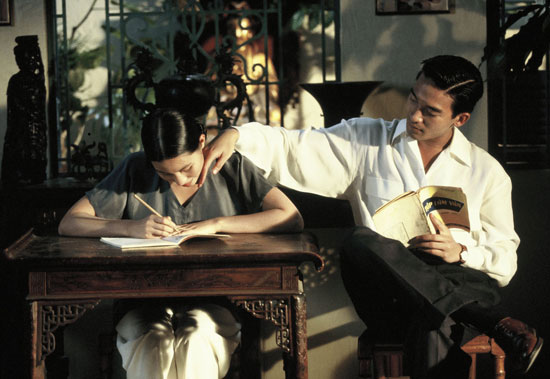
Starring Tran Nu Yen-Khe, Lu Man San, Thi Loc Truong. In English, Vietnamese with English subtitles. A Willow and Thatch favorite!
Star of India (1953): A 17th-century French nobleman embarks upon a search for a valuable emerald which has been stolen from a Dutch collection. Dogging the nobleman’s trail is a Dutch spy posing as a French aristocrat. Both are bedeviled by the epicene villain who stole the gem in the first place, but who enjoys the protection of King Louis XIV.
Starring Cornel Wilde, Herbert Lom, Jean Wallace, John Slater, Yvonne Sanson.
Swallows and Amazons (2016): This delightful family adventure film follows four children who dream of escaping from the tedium of a summer holiday. When finally given permission to camp on their own on a remote island in the middle of a vast lake, they are overjoyed. But when they arrive, they discover they may not be alone and a desperate yet whimsical battle for ownership of the island ensues, where both skill and luck play a hand.
The dangers of an adult world on the brink of war encroach on their paradise and intertwine with their lives in the form of a mysterious pair of Russian spies hot on the tail of the enigmatic Jim Turner. The children must ban together, learn skills of survival, responsibility, and the all-important value of friendship to save a family member. Steeped in the wonder of a child’s imagination and set against a breath-taking island backdrop, this is an exhilarating adaptation of a treasured classic.
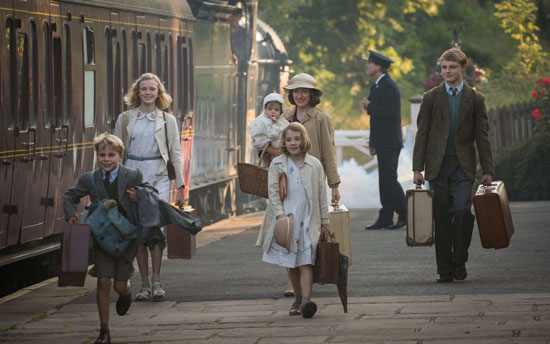
“…It’s heartening to see Ransome’s fiction taking on a new and more independent form, suggesting an ongoing relevance for a series of books that could easily be viewed as too dated for modern children. As the kids put it: Swallows and Amazons forever.” – Catherine Bray, Variety
“The film’s pleasures are simple – soaring landscapes, old-school DIY adventure and some sweet performances by the child actors. It makes for a charmingly old-fashioned family adventure – one that you can imagine several generations of a family gathering to watch on a rainy grey Sunday afternoon.” – Dave Calhoun, Time Out
Starring Andrew Scott, Dane Hughes, Hannah Jayne Thorp, Kelly Macdonald, Orla Hill, Rafe Spall, Seren Hawkes, Teddie-Rose Malleson-Allen. Watch the TRAILER. Off-book but highly recommended if you don’t mind that. Suitable for family viewing.
Telling Lies in America (1997): Karchy Jonas was born in Hungary and immigrated to Cleveland in the early 1960s, where he felt adrift in a strange sea of American culture. At home, his stern father insists that he adhere to traditional Hungarian ways. Karchy’s only respite is the rock & roll he adores. A year before he arrived, flashy, failed disc jockey Billy Magic rolled into town and became the host of the High School Hall of Fame contest, something that Karchy decides he must win so he can impress his classmate Diney.
The DJ proves to be a real pal and pays Karchy to run errands and do odd jobs for him. When not working, Billy introduces Karchy to life’s wild side. But despite the fun, there is much the naive youth is destined to learn the hard way about his new buddy Billy.
Starring Brad Renfro, Callista Flockhart, Jonathan Rhys-Meyers, Kevin Bacon, Luke Wilson.
Tenshin (2014): One hundred years after the death of Tenshin Okakura, director Katsuya Matsumura pays tribute to this legendary artistic leader. Born in 1863, Okakura Tenshin became a well-known government official and an artistic leader. He was also a man of international perspective; he published “The Book of Tea” in English and introduced Japanese and other East Asian cultures and art to westerners.
Tenshin follows the great Okakura Kakuzo (Tenshin) as he establishes himself as a trailblazer in the art world who ultimately lead to the development and preservation of modern Japanese art in the Meiji era (a period during which dramatic westernization took place). Featuring standout performances from international stars, Tenshin takes a close examination into the inspiring and sometimes volatile life of who most consider, the “father” of Japanese modern art.
Starring Naoto Takenaka, Shido Nakamura. In Japanese with English subtitles. Rated PG-13. Watch the TRAILER.
That Hamilton Woman (1941): One of cinema’s most dashing duos, real-life spouses Vivien Leigh and Laurence Olivier live their greatest on-screen romance in this visually dazzling tragic love story from legendary producer-director Alexander Korda. Set against the backdrop of the Napoleonic Wars of the late eighteenth century, That Hamilton Woman is a gripping account of the scandalous adulterous affair between the British Royal Navy officer Lord Horatio Nelson and the renowned beauty Emma, Lady Hamilton, the wife of a British ambassador. With its grandly designed sea battles and formidable star performances, That Hamilton Woman (Winston Churchill’s favorite movie, which he claimed to have seen over eighty times) brings history to vivid, glamorous life.
Starring Alan Mowbray, Laurence Olivier, Vivien Leigh. Watch the TRAILER.
Theeb (2014): Nominated for the 2016 Academy Award for Best Foreign Language Film. In 1916, while war rages in the Ottoman Empire, Hussein raises his younger brother Theeb (“Wolf”) in a traditional Bedouin community that is isolated by the vast, unforgiving desert. The brothers’ quiet existence is suddenly interrupted when a British Army officer and his guide ask Hussein to escort them to a water well located along the old pilgrimage route to Mecca. So as not to dishonor his recently deceased father, Hussein agrees to lead them on the long and treacherous journey.
The young, mischievous Theeb secretly chases after his brother, but the group soon find themselves trapped amidst threatening terrain riddled with Ottoman mercenaries, Arab revolutionaries, and outcast Bedouin raiders. Naji Abu Nowar’s powerful and assured directorial debut, set in the land of Lawrence of Arabia, is a wondrous “Bedouin Western” about a boy who, in order to survive, must become a man and live up to the name his father gave him.
Starring Hassan Mutlag, Hussein Salameh, Jacir Eid, Jack Fox, Marji Audeh. In Arabic with English subtitles. Watch the TRAILER. Recommended.
Thousand Pieces of Gold (1991): Set in the 1880s, this film chronicles the journey of Lalu (Rosalind Chao), a Chinese woman whose financially desperate family sells her as a bride. She is sent to the United States, where she is bought by barkeep Hong King (Michael Paul Chan), who plans to make money off of Lalu by forcing her into a life of prostitution. Unwilling to submit to his demands, she begins her own successful business venture and captures the attention of the troubled but kindly Charlie (Academy Award winner, Chris Cooper).
Starring Chris Cooper, Dennis Dun, Michael Paul Chan, Rosalind Chao.
The Threepenny Opera (1931): The sly melodies of composer Kurt Weill and the daring of dramatist Bertolt Brecht come together on-screen under the direction of German auteur G. W. Pabst (Pandora’s Box) in this classic adaptation of the Weimar-era theatrical sensation. Set in the impoverished back alleys of Victorian London, The Threepenny Opera follows underworld antihero Mackie Messer (a.k.a. Mack the Knife) as he tries to woo Polly Peachum and elude the authorities. With its palpable evocation of corruption and dread, set to Weill’s irresistible score, The Threepenny Opera remains a benchmark of early sound cinema.
Starring Carola Neher, Lotte Lenya, Rudolf Forster. In German with English subtitles. Willow and Thatch recently watched this, and though it took a bit to get into, quite enjoyed it overall.
Three Sisters (1970): Nearly a thousand miles away from their beloved Moscow, Chekhov’s Three Sisters live in virtual exile. Olga (Jeanne Watts), a schoolmistress, attempts to support her siblings and the home that is the sole legacy of their late army officer father. Masha (Joan Plowright) finds relief from her empty marriage in an affair with a passionate young colonel, played by Alan Bates. Irina (Louise Pernell), the youngest, wills herself to return the affections of an ardent suitor in the hopes that he will whisk her off to the city before it is too late. Intoxicated by yesterday’s triumphs and heedless of tomorrow’s disasters, the Three Sisters are left to sift through the debris of their shattered dreams on the eve of the social and political upheaval that will transform Russia forever.
Stepping behind the camera for the first time since 1957’s The Princess and the Showgirl, director Laurence Olivier demonstrates the same facility for cinematic expression that made his filmed versions of Hamlet and Henry V so definitive. In Olivier’s assuredly brisk, graceful, meticulous, and witty rendering of Chekhov’s masterpiece, the sisters are doomed to remain in their provincial purgatory. Olivier shepherds the cast of National Theater of London members (including Olivier himself and I Claudius star Derek Jacobi, in one of his first screen roles) through a compelling drama that never stoops to cliche. Photographed by ace British lensman Geoffrey Unsworth (2001: A Space Odyssey, Tess), Olivier and his cast propel Chekhov’s play into a film that the New York Times’ Vincent Canby acclaimed as “something quite rare.”
Starring Alan Bates, Joan Plowright, Laurence Olivier. Rated G
The Trip to Bountiful (1985): Forced by circumstances to live her loathsome son and daughter-in-law, elderly Mrs. Watts wants nothing more out of life than to return to her home town of Bountiful. Escaping from her family’s clutches, she boards a bus to Bountiful, where she makes the acquaintance of young Thelma. The two women immediately hit it off, and their trip is a most pleasant one.
Eventually, the local sheriff, ordered to find Page and bring her back to her family, catches up with the old woman just a few miles from Bountiful. Feeling sorry for her, he permits her to complete her sentimental journey, even though he knows full well that Bountiful is now a ghost town of empty ruins and dilapidated shacks. It doesn’t matter, though: she sees Bountiful just as it was when she left it, and for the first time in years is truly happy and at peace with herself. Set in the 1940s.
“Geraldine Page inhabits the central role with authority and vinegar. The movie surprises us: It’s not really about conflict between the generations, but about the impossibility of really understanding that you are even a member of an older generation, that decades have gone by.” – Roger Ebert
Starring Carlin Glynn, Geraldine Page, John Heard, Rebecca De Mornay, Richard Bradford. Rated PG. Recommended!
Tristana (1970): Tristana stars Catherine Deneuve as an orphaned young woman who becomes the ward of a nobleman (Fernando Rey) who seduces her. She then leaves him for an artist (Franco Nero), but returns to her aging benefactor and calculatingly hastens his demise.
Directed by Luis Buñuel. Based on the eponymous novel by Benito Pérez Galdós, the story is set in the late 1920s to early 1930s.
“Luis Buñuel’s “Tristana” is a haunting study of a human relationship in which the power changes hands. A few great directors have the ability to draw us into their dream world, into their personalities and obsessions and fascinate us with them for a short time. This is the highest level of escapism the movies can provide for us. A powerful director like Buñuel can open up his mind to us, the way an actress can open up her eyes. It is an experience worth having.” – Roger Ebert
Starring Catherine Deneuve, Fernando Rey, Franco Nero. In Spanish with English subtitles. Rated PG-13 and contains adult subject matter. Watch the TRAILER. Recommended.
Ugetsu (1953): In 16th century Japan, peasants Genjuro and Tobei sell their earthenware pots to a group of soldiers in a nearby village, in defiance of a local sage’s warning against seeking to profit from warfare. Genjuro’s pursuit of both riches and the mysterious Lady Wakasa, as well as Tobei’s desire to become a samurai, run the risk of destroying both themselves and their wives.
“Quite simply one of the greatest of filmmakers,” said Jean-Luc Godard of Kenji Mizoguchi. And Ugetsu, a ghost story like no other, is surely the Japanese director’s supreme achievement. Derived from stories by Akinari Ueda and Guy de Maupassant, this haunting tale of love and loss–with its exquisite blending of the otherworldly and the real–is one of the most beautiful films ever made.
Starring Kinuyo Tanaka, Machiko Kyô, Masayuki Mori. In Japanese with English subtitles.
The Well-Digger’s Daughter (2011): In this sun-drenched melodrama, acclaimed French actor Daniel Auteuil directs and stars as the eponymous well-digger Pascal, a widower who is torn between his sense of honor and his love for his eldest daughter, Patricia (the luminous Astrid Berges-Frisbey), when she gets impregnated by a wealthy young pilot. Set in 1939 and 1940.
Twenty-five years after rising to international acclaim in Jean de Florette and Manon of the Spring, Daniel Auteuil returns to the world of Marcel Pagnol for his first work as director with this celebrated remake of the 1940s classic.
“To call “The Well Digger’s Daughter” an old-fashioned film is to pay it a compliment. Here is a love story embedded in traditional values.” – Roger Ebert
“It’s classical moviemaking of a sort rarely seen now, a love story of surprising joy with rounded, flawed but humane characters.” – Minneapolis Star Tribune
Starring Daniel Auteuil, Kad Merad, Astrid Bergès-Frisbey, Nicolas Duvauchelle. In English, French, with English subtitles. Watch the TRAILER. Recommended.
Wild Geese (1959): Hideko Takamine stars as Otama, a young woman who is forced to become a mistress to a married, middle-aged man in order to support her father, in this meiji period drama directed by Shiro Toyoda.
Starring Hideko Takamine, Hiroshi Akutagawa, Jûkichi Uno. In Japanese with English subtitles.
The Woman and the Stranger – Die Frau und der Fremde (1985): Karl and Richard, two German soldiers captured by the Russians in World War I, become very close friends–so close that Richard shares intimate stories about his wife, Anna. Through these stories, Karl falls in love with her in his thoughts. When Karl escapes and goes to Richard’s home, Anna knows he is not her husband. But although she tries to resist Karl’s love, she feels a growing response to him. Then, one day, Richard returns…
This beautifully-shot and -crafted work was the only East German film to ever win the Golden Bear at the West German Berlin International Film Festival. Shortly after this success, however, the film’s distribution was suspended due to problems with the literary rights. After over 20 years, the film is now finally available again.
Starring Joachim Lätsch, Kathrin Waligura, Peter Zimmermann, Siegfried Höchst. In German with English subtitles.
Wondrous Boccaccio (2015): Florence, Thirteenth Century. The “Black Death” is spreading. Ten kids (three boys and seven girls) decide to escape and to seek shelter in the countryside, away from the horrible consequences of the plague. In order to kill time, each kid tells a particular story, but no matter how different their stories may be, they all have one aspect in common: love. A love that will help the characters cope with the numerous uncertainties of a very arduous age.
Starring Carolina Crescentini, Flavio Parenti, Lello Arena, Paola Cortellesi, Vittoria Puccini. In Italian with English subtitles. Watch the TRAILER.
Wuthering Heights (2011): Andrea Arnold’s WUTHERING HEIGHTS is an excitingly fresh and distinct take on the classic novel by Emily Bronte.
An epic love story that spans childhood well into the young adult years, the film follows Heathcliff, a boy taken in by a benevolent Yorkshire farmer, Earnshaw. Living in Earnshaw’s home, Heathcliff develops a passionate relationship with the farmer’s teenage daughter, Catherine, inspiring the envy and mistrust of his son, Hindley. When Earnshaw passes away, the now-grown characters must finally confront the intense feelings and rivalries that have built up throughout their years together.
Arnold’s film is a beautiful and evocative visual masterpiece that brings out the powerful emotions at the heart of Bronte’s classic novel, resulting in a viscerally affecting love story. It is a sweepingly old-fashioned tale of family, class, and romance told in a bracingly modern way by one of contemporary cinema’s most gifted and unique filmmakers. Winner of Outstanding Technical Contribution and nominated for the Golden Lion at the Venice Film Festival.

“Arnold has been successful in reimagining the story’s archetypal emotions in the story, bringing it closer to its passionate elements.” – Roger Ebert, Chicago Sun-Times
Starring James Howson, Kaya Scodelario, Solomon Glave, Shannon Beer, Paul Hilton. Watch the TRAILER.
Young Goethe in Love (2010): Germany 1772 – the young and tumultuous Johann Goethe (Alexander Fehling) aspires to be a poet; but after failing his law exams, he is sent by his father to a sleepy provincial court to mend his ways. Unsure of his talent and eager to prove himself, Goethe soon wins the praise and friendship of his superior Kestner. But then Lotte enters his life and nothing is the same as before. However, the young lovers are unaware that her father has already promised Lotte’s hand to another man.
“While Stolzl is clearly borrowing from other historical flights of fancy, such as Amadeus and Cyrano de Bergerac, along with Shakespeare in Love, the helmer and fellow screenwriters Christoph Mueller and Alexander Dydyna expertly mold these elements to fit the characters and situations’ own requirements, and expertly alternate romance, humor and drama without losing their grip on the characters and their dilemmas.” – Variety
Starring Alexander Fehling, Miriam Stein, Moritz Bleibtreu, Henry Huebchen, Volker Bruch. Watch the TRAILER. Award-winning and recommended.
The Youth of Peter the Great (1980): The first part of a two-part film that ends with At the Beginning of Glorious Days. Both parts were released in the Soviet Union in 1980 and are based on a novel, Peter I, written by Aleksey Tolstoy. The film was directed by Russian director Sergey Gerasimov. The movie is considered to be a classic of Russian historical cinema.
The youth of the young czar was full of life threatening experiences, which include the threats from boyars, the uprising of Streltsy, and the coming to power of czarevna Sophia. But, at this time, Peter shows his might by using his wit and self-determination, with help of which he will disarm his enemies outside and inside of his nation.
Starring Daniil Sagal, Pavel Olenev, Vera Maretskaya, Vladimir Lepeshinsky. In Russian with English subtitles.
19th Century Georgian Chronicle (1979): A poetized chronicle of the events taking place in one of the Georgian villages in the late 19th century, when, to save a forest, the innumerous intelligentsia could rally the people and oppose the industrialists.
Starring Mamuka Salukvadze, Ramaz Chkhikvadze, Tsutsa Medzmariashvili, Vladimir Tsuladze. In Russian with English subtitles.
What else? You’ll also find a series produced by BBC of all of William Shakespeare’s plays (Ambrose Video), Jamaica Inn (1939), Robinson Crusoe (1954), The Rise of Catherine the Great (1934), Fire Over England (1937), Aguirre, the Wrath of God (1972), The Virgin Spring (1960), Passion of Joan of Arc (1928), The King of Kings (1927), The Private Life of Henry VIII (1933), Cyrano De Bergerac (1925), Little Lord Fauntleroy (1936), Beloved Rogue (1927), The Corsican Brothers (1941), The Man in the Iron Mask (1939), A Doll’s House (1973), Kit Carson (1940), The Last of the Mohicans (1936) and more period dramas to watch online for free.
*Though not yet available to public libraries as of 9/20/17, if you have access to a participating university library, you’ll also be able to stream the following BBC period dramas on Kanopy’s platform: An Inspector Calls (2015), Bleak House (2005), Call the Midwife (2012), The Canterbury Tales (2003), Carrie’s War (2004), Copenhagen (2002), Crime and Punishment (2002), Daniel Deronda (2002), Emma (2009), The Go-Between (2015), Great Expectations (2011), Jane Eyre (2006), Lady Chatterley’s Lover (2014), Lark Rise to Candleford (2008), Little Dorrit (2008), The Mystery of Edwin Drood (2012), Oliver Twist (2007), Robin Hood (2006), Sense and Sensibility (2008), Tess of the D’Urbervilles (2008), Turn of the Screw (2009), Under The Greenwood Tree (2005).
Documentaries You May Also Like

A History of India: Over 5,000 years, India has been home to a rich tapestry of cultures, and the lands east of the Indus River have long been a hub for trade and cultural exchange. Today the subcontinent contains 20% of the world’s population and is an economic powerhouse. Go inside this thrilling story with A History of India, a breathtaking survey of South Asia from its earliest societies through the challenges of the 21st century. Look for episodes like The British East India Company and The British Raj and Early Nationalism. Part of The Great Courses.
America in the Gilded Age and Progressive Era Series: Over six innovative decades marked by economic, political, social, and technological upheavals, the U.S. went from an agrarian, isolationist country to the greatest industrial power and a nascent geopolitical superpower. Meet inventors, conservationists, robber barons, civil rights activists, and industrialists, who together forged a new nation. Part of The Great Courses.
American Experience: The Abolitionists (PBS): Vividly bringing to life the epic struggles of the men and women who fought to end slavery, THE ABOLITIONISTS tells the intertwined stories of Frederick Douglass, William Lloyd Garrison, Angelina Grimke, Harriet Beecher Stowe and John Brown. Fighting body and soul, they led the most important civil rights crusade in American history. What began as a pacifist movement became a fiery and furious struggle that forever changed the nation. Black and white, Northerners and Southerners, poor and wealthy, these passionate anti-slavery activists tore the nation apart in order to form a more perfect union. The series, which tells the story largely through period drama narrative, airs 150 years after the Emancipation Proclamation took effect in January 1863. 3 episodes.
The Art of Gothic (BBC): How gothic captured the Victorian soul. The Art of Gothic ventures deep into the heart of 19th century Britain to explore how the gothic style rose from ridicule to define the era. It is a period synonymous with progress. But at the same time, a group of men and women seemingly spurned the modern age, turning to the medieval past as a source of inspiration. From Horace Walpole to John Ruskin to Bram Stoker, The Shock of the Old is the tale of how an old, derided style of architecture became a defining characteristic of the Victorian age and was as important as the Romantic and Modernist movements that it bridged. Discover how the gothic style went from vulgar to the height of fashion; how it first symbolised tradition before becoming the hallmark of industrial progress; and how it gave voice to the savage horrors of the time.
Birth of Empire: East India Company – The Rise and Fall of an Imperial Power (BBC): Over the past 10 years, India and China have been among the fastest growing economies in the world. But at one time England controlled India, helping to create its major cities, and was heavily invested in China, It was England’s economy and trade that dwarfed others. And it was all in the hands of the first and greatest multi-national company: the behemoth that was the East India Company. On the ground in India, Dan Snow sets out to discover the motives of those who set up the company at the beginning of the seventeeth century. How did it grow into an Imperial power? What influence and impact did the Company have on the globe? A hotbed of corruption and greed, and responsible for the deaths of over one million people, just how did the Company manage to attain such power and what led to its explosive decline?
The Brontes: Fantasy And Reality: Excerpts from journals, letters, poetry and prose enrich this narrative biography of Anne, Charlotte and Emily Bronte. The program introduces the sisters’ major works and illuminates their basic, recurrent themes. Samples of their own art-work, on-location photography of northern England, as well as prints, paintings and sketches portray the land and the period.
Elizabeth Bennet–A Proper Pride: Meet the charming heroine from Jane Austen’s Pride and Prejudice. The story of her complicated relationship with Mr. Darcy is a realistic Cinderella story and has lent itself to numerous adaptations, including Bridget Jones’s Diary. Consider the integral role that money and social class play in this classic tale of love and romance. Taught by Professor at Saint Louis University, Professor at University of Cambridge, Thomas Shippey Ph.D. It’s part of The Great Courses / Heroes and Legends, The Most Influential Characters of Literature Series which also includes Harry Potter, Sherlock Holmes, Huckleberry Finn, Robinson Crusoe, Fairy-Tale Heroines and others.
England – A Two Weeks Tour: In 60 minutes you will see many of the highlights that a visitor can see in England in a few weeks, including quaint villages and towns, major cities, and the countryside. The lifestyles of the people and the character of what is English is also shown in this documentary. Included are visits to: London, Norwich, Lincoln, Oxford and Cambridge university cities, Bath, Windsor and its famous castle, Lavenham – an intact medieval wool village, Stratford Upon Avon – Shakespeare’s birthplace, Warwick and the finest medieval castle in England, Stonehenge – the most famous prehistoric monument in Great Britain, Brighton, Southwold and other seaside towns, stately homes including Chatsworth, one of England’s grandest. All this and more in a program following two tourists as they discover more than just the usual tourist attractions.
The Genius of Marie Curie (BBC): Over 80 years after her death, Marie Curie remains by far the best known female scientist. In her lifetime, she became that rare thing: a celebrity scientist, attracting the attention of the news cameras and tabloid gossip. They were fascinated because she was the first woman to win the Nobel Prize and is still the only person to have won two Nobels in two different sciences. But while the bare bones of her scientific life, the obstacles she had to overcome, the years of painstaking research, and the penalty she ultimately paid for her discovery of radium have become one of the iconic stories of scientific heroism, there is another side to Marie Curie: her human story. This multi-layered film reveals the real Marie Curie, an extraordinary woman who fell in love three times, had to survive the pain of loss, and the public humiliation of a doomed love affair. It is a riveting portrait of a tenacious mother and scientist, who opened the door on a whole new realm of physics, which she discovered and named: radioactivity.
The Genius of Palaces (BBC): A nation’s story in stone. Genius of Palaces unlocks the secrets behind some of Britain’s most magnificent palaces, from construction to an extraordinary portrait of changing society. Whilst fortresses and castles were strongholds built primarily for defence, palaces have been the grand and beautiful residences of illustrious bishops and kings as far back as the Romans. Genius of Palaces looks at how, for centuries, they have been at the heart of a kingdom’s social and political life, reflecting the personalities of the men who built them. Historian Dan Cruickshank decodes the artistic languages of palaces from Renaissance iconography to the perfection of Palladian architecture, introducing the noble and architectural brains behind the turrets, balustrades and colonnades. Modern day craftsmen and carpenters reveal the extraordinary labour that went into constructing palaces, and drawing on contemporary accounts and inventories, the series reveals the day-to-day lives of servants and courtiers who were the lifeblood of these beautiful buildings.
Great Estates of Scotland (PBS): This four-part series takes an in-depth look at the workings of some of Scotland’s most magnificent country estates through the eyes of the current owners, the ghillies, the gardeners and the housekeepers, not forgetting the paying guests who frequent these stunning country estates. The programs, filmed entirely in Scotland, tell the fascinating stories behind these magnificent buildings.
Henry VIII’s Enforcer: The Rise and Fall of Thomas Cromwell (BBC): Thomas Cromwell is one of English history’s most fascinating characters and one of the strongest supporters of the English Reformation. At a time when lineage meant everything, this self-taught man, from the backstreets of London, rose from his poor beginnings to become chief minister to King Henry VIII and Earl of Essex, one of the oldest noble titles in England. However, in the moment of this, his greatest triumph, Cromwell was struck down and destroyed. He fell victim to the King’s anger, giving his opponents the opportunity they needed to persuade Henry VIII that Cromwell should die. He was beheaded on 28 July 1540. Cromwell has gone down in history as an ambitious and corrupt man; a ruthless politician who destroyed people and institutions to enrich his king. In this programme Professor Diarmaid MacCulloch presents a different picture of Cromwell – suggesting Henry’s best servant was a cool, self-contained idealist who wanted to change the kingdom of England in the name of a new religion. The programme starts with Cromwell’s rise to power, examining his relationship with Cardinal Wolsey and his role in the King’s divorce. It discovers what Cromwell did with his new power; rising through the ranks, shaping the new Church of England, and the dissolution of the monasteries. Finally the programme looks at Cromwell’s last days, his sudden arrest and execution. Using contemporary documents, dramatic paintings, and period locations, MacCulloch travels through Tudor England, visiting the church in Putney where the young Cromwell would have gone to Mass, sailing to Hampton Court where Cromwell first visited Wolsey and in later years, the King, and to the Tower of London where he finally ended his days. This is the story of the real Cromwell. A commoner who rose to power under the most mercurial of kings. A man who flew too close to the sun.
In Search of the Brontes (BBC): The story of three sisters, their precocious creativity, the scandalous reputations they sought to subvert and the mythical legacy they deliberately left behind. It is a story of alcoholism and illness, of thwarted passion and unrequited love, and of a 19th-century quest for fame. When people think of the Brontes, they think of emotionally fragile young women on windswept moors, beset by family tragedy, channelling their pent-up emotions into some of the most passionate and enduring novels of the 19th Century. All of this is entirely accurate – but it is not the whole truth. This two-part documentary shatters the myths that have surrounded the sisters since their untimely deaths 150 years ago and sets the record straight.
Last Days of Anne Boleyn (BBC): Anne Boleyn is one of the most famous and controversial women in British history. In 1536, she became the first queen in Britain’s history to be executed. The brutal speed of her downfall, and the astonishing nature of the charges against her – treason, adultery, even incest – makes her story shocking even to this day. Yet whilst we know how Anne died, the story of why she had to go and who authored her violent end has been the subject of fiery debate across six centuries. In a radical new approach to televised history, a stellar cast of writers and historians, including Hilary Mantel, David Starkey, Philippa Gregory and others, battle out the story of her last days and give their own unique interpretations of her destruction.
Locomotion: Dan Snow’s History of Railways (BBC): Dan Snow presents this three-part documentary series on the history of railways. Snow explores how Britain’s railway has developed over the years from track-ways used for coal carts in the early 18th century to metal tracks, steam locomotives and the complex system of tunnels, bridges and cuttings.
The Manners of Downton Abbey (PBS): What goes on behind-the-scenes to get the manners of 1900s Britain exactly right on Downton Abbey? Enter the world of English etiquette with host Alastair Bruce, historian, expert on royal ceremony and custom, and the historical advisor to the hit drama series. This one-hour documentary features revealing interviews with leading cast members, including Hugh Bonneville, Michelle Dockery, Elizabeth McGovern, Laura Carmichael, Joanne Froggatt, Brendan Coyle, Sophie McShera and others. Discover the secrets of how the aristocratic set dined and dressed, how they married and made money, how they interacted with the servants, and above all why they behaved as they did. Illustrated with memorable moments from Downton Abbey, the program is a treat for fans and anyone fascinated with the customs of early 1900s Britain.
Medieval London (BBC): Exploring our murky past. Do you have to dodge the contents of bedpans or step over rotting corpses on your way to work? Well, you may have had to if you’d lived in London, New York or Paris when they were filthy cities. Dan Snow presents this immersive series, which brings these cities’ stinking histories vividly to life. Taking the travelogue in a whole new direction – with extraordinary, hands-on demos and stunts – it excavates the murky past in gruesome detail during defining periods in history. You’ll find out how each of these modern capitals was forged in the muck of the past, emerging from ‘filthy cities’ into three of the world’s model metropolises.
Seven Wonders of the Industrial World (BBC): An encounter with the most brilliant pioneers of the industrial age. Recreating their stories of burning ambition, extravagant dreams, passion and rivalry as great minds clashed, this series of BBC TV programmes delves into the history of seven epic monuments spanning the industrial revolution. 7 episodes.
Shakespeare in Italy (BBC): Shakespeare was in love with Italy. A third of his plays are set in the country. For the Elizabethan playwright, it was the stage on which to explore his greatest themes – love and war, fidelity and betrayal, and above all, politics – and a treasure house of legend and stories that fuelled his imagination. Combining Italian travelogue with revelations about the bard’s most famous works, Francesco da Mosto visits the spectacular locations, traces the Italian myths and reveals how a long dead, foreign playwright’s imagination continues to influence and shape real Italian cities, even now. 2 episodes.
Shaping of the Western World Collection: Outstanding programs that re-create key episodes of human drama and spectacle in the history of the Western World. The 23 programs in this series, all of feature-film caliber and starring well-known actors, were filmed in actual historical locations around the globe and produced with advice from scholars at leading universities who participated as consultants. Includes episodes The Changing World of Charles Dickens, Charlemagne, The Crusades, Elizabeth, The French Revolution and more.
The Stuarts – Britain’s Defining Royal Family (BBC): This three-part series argues that the Stuarts, more than any other, were Britain’s defining royal family. We tend to take today’s modern United Kingdom for granted, but there was nothing inevitable about its creation. During the 17th century, the Stuarts grappled with the chaos of three separate kingdoms, multiple religions and civil war. Britain has not known a century like it and some of the questions this dynasty faced have not gone away.
The Tea Trail with Simon Reeve (BBC): Adventurer and journalist Simon Reeve heads to east Africa to uncover the stories behind Britain’s favourite drink. During a fascinating journey, Simon discovers the history and issues of the tea trade. Many assume that the leaves that go into everyday teabags come from India or China but in fact they are bought from an auction in the coastal city of Mombasa in Kenya. From here, Simon follows the tea trail through the epic landscapes of Kenya and Uganda and meets some of the millions of people who pick, pack and transport our tea. Drinking tea with the everyone from Masai cattle herders to the descendants of the original white tea planters, Simon learns along the way that the industry is not immune to the troubles of the continent, including poverty, low wages and child labour.
Wellington – The Iron Duke Unmasked (BBC): Rising from awkward middle son, living in his elder brother’s shadow, and unpromising junior officer, Arthur Wesley became the 1st Duke of Wellington, and a towering figure in British history. But how much do we really know about the Iron Duke, and how do his private, personal thoughts fit with his public persona? As this documentary reveals, the true nature of the Duke’s character was far different. The film focuses on the intriguing complexities of Wellington, his character, personality, and relationships, told through his own words and the words of those who knew him. Using a rich and extensive written archive, it goes beyond the well-worn cliches to reveal the real man behind his reputation as a phlegmatic hero.
Winston Churchill – Winning The War, Losing The Peace (BBC): The 26 July 1945 has gone down as one of the greatest shocks in British electoral history. Triumphant wartime leader Winston Churchill and the Conservative party were heavily defeated. The Labour opposition, which had never before won a majority of parliamentary seats, was elected on a landslide. It was a stunning and utterly unexpected result, which changed the course of British politics. But why had Churchill, whose stock could have been no higher after the conclusion of the World War Two, been rejected by the people he led to victory? And why had the rejection been so complete? Gathering together a cast of illustrious historians, biographers and writers, this film seeks answer as to why a man seemingly at the height of his popularity was so dramatically ousted from power.
The Women of World War One (BBC): In 1914 women all over Europe were experiencing the impact of a war that reached into every corner of people’s lives. In Britain, war came to the Home Front and in doing so ushered in a seismic shift in the lives of women far from the front line of battle, and this fascinating programme is filled with examples of women from all walks of life, every class and every corner of Britain, and their contributions to the war effort – in the factories, the banks, pulpits and even football pitches. This is their story and shows how, ultimately, victory lay not just in leaving the traditional confines of their lives behind and shouldering responsibility as never before, but culminated in women gaining the vote. The Enfranchisement Bill passed on 6 February 1918 can be attributed to Britain’s wartime women fighting on the Home Front.
![]()
If you enjoyed this post, be sure to wander over to The Period Films List, for historical and costumes dramas sorted by era. You’ll also want to see the Willow and Thatch YouTube Channel which curates thousands of period drama trailers, commentaries, sneak peeks and even offers full period movies to watch for free online. Then visit Kanopy to see if your library is participating, and to create a playlist using the period dramas listed above as your starting point.
But before you go…
 Willow and Thatch exists because of you: You can shop our Jane Austen Period Drama Adaptations merchandise, click on our links (like these that take you to Etsy and Amazon) and make purchases on those sites, and buy period-inspired products from the Lovely Things Shop. You can also continue to share our articles, or make a financial contribution by emailing us. All these things allow us to write feature articles, update The Period Films List, mail out our newsletter, maintain the website and much more. Thank you!
Willow and Thatch exists because of you: You can shop our Jane Austen Period Drama Adaptations merchandise, click on our links (like these that take you to Etsy and Amazon) and make purchases on those sites, and buy period-inspired products from the Lovely Things Shop. You can also continue to share our articles, or make a financial contribution by emailing us. All these things allow us to write feature articles, update The Period Films List, mail out our newsletter, maintain the website and much more. Thank you!


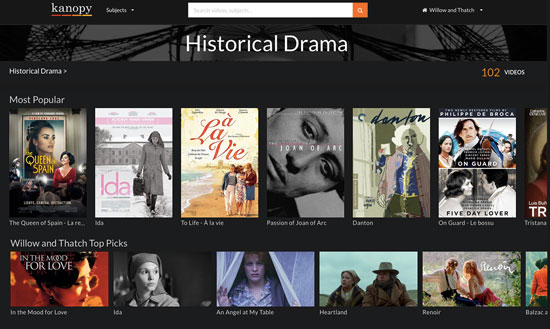


Ginger Monette
September 21, 2017 at 8:33 am (8 years ago)Darn! I can’t believe a library as large as mine doesn’t offer this (Charlotte, NC). I filled out the request so hopefully they will get it!
Willow and Thatch
September 21, 2017 at 9:27 am (8 years ago)Oh no! Hopefully it won’t be long!
Lewis How
September 21, 2017 at 4:36 am (8 years ago)I fear the streaming service may not be available in Canada?
Willow and Thatch
September 21, 2017 at 7:47 am (8 years ago)Kanopy is already in parts of Canada, and you can use the instructions above to suggest your library if not. Follow the link at the end of the interview to check your library’s status.